

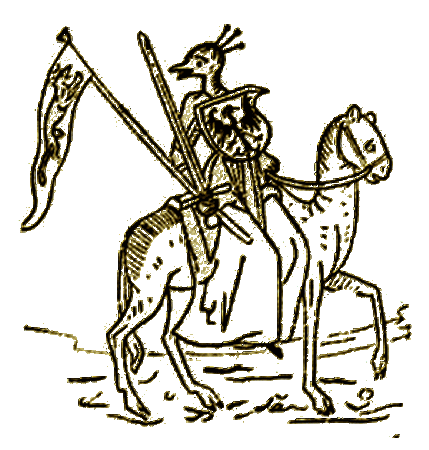
 RIDE is the first of the deadly sins and painted in
the likeness of a peacock; there are few without this sin in great or
small degree, and there is no sin so likely to catch a man by the heels
and trip him into Hell's Mouth."
RIDE is the first of the deadly sins and painted in
the likeness of a peacock; there are few without this sin in great or
small degree, and there is no sin so likely to catch a man by the heels
and trip him into Hell's Mouth."
So spake the old monk, sitting by the fire, talking to the young novices on the long winter's evening; they liked to listen to the holy stories the old monk told them, for there was always a good comforting moral and some matter of interest too, for he had been in the world once, and remembered it well enough, though he was now so far on the path to heaven.
"A man without pride," he continued, "is a saint, and a man all pride is a devil, and a dangerous devil especially if he be not a man at all, but a woman."
"Ah," said the novices wisely, and they looked into the fire and shook their heads and pursed their lips.
"The monk finished his glass of Hippocras, wiped his lips and proceeded to tell the story of pride, the first deadly sin.
"When I was in Paris." he said, "learning theology at the Sorbonne, I often saw riding in a gilt chariot—the Queen."
"The Queen!"
"As you may have heard, her name was Isabeau, and she came from the East; her clothes were a wonder, her life was a scandal; she was quite the proudest creature any man had ever seen or heard of; she boasted that she had never set her foot in the public street nor in the house of one who was of less than blood royal; there was always a body of the Scottish Archers about her car to prevent the mud from touching her wheels, and the foul breath of the baser sort from reaching her.
"But she did not mind their eyes; indeed, she was always raised high on her cushions that they might see her, and if she was in a litter, the curtains were drawn, and her beauty was displayed as freely, nay, as wantonly, as that of any common creature who goes about seeking her price.
"The treasury was empty because of her vesture and her servants and her dainty meats, her silk sheets, her baths of rose-water; the soldiers were few and so were the ships; the peasants were rioting in the country; the nobles pawned their plate, but the Queen went in cloth-of-gold and wore the keep of a regiment in a single ring.
"You will have heard of the king...He was foolish in his mind, and played with clocks and cards all day long in his closet; his only company was his jester, and they were both in frayed robes and ill-nourished. He neither saw the Queen nor asked after her; they said that she had broken his heart and shattered his wits long ago.
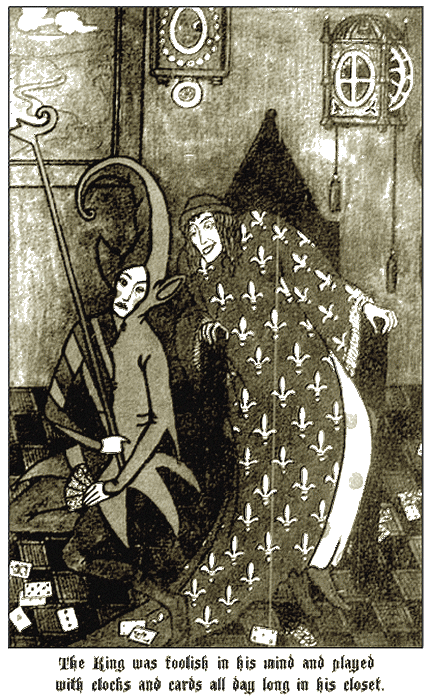
"There were, of course, many cavaliers in her train—I have told you she was beautiful; her eyes and her hair were tawny, like a dark tiger-skin, her complexion was clear yet golden, the carnation deep in the cheeks. The whole effect of her face was golden; she sparkled and glowed without the aid of jewels.
"It was said she put dye upon her lips and cheeks, the juice of scarlet geranium petals; I do not know, nor did it matter; she was beautiful as only a proud, shameless woman can be—beautiful to strike the eye and hold the heart, to excite, to subdue, to awe, to lure...
"I often saw her ride past the Sorbonne; her head-dress three or four feet high, scarlet, sparkling with gems, and hung with a thin white gauze veil, that now floated away from her face and now obscured it...Across her shoulders the fine ermine robe, flecked here and there with black, would fall apart, disclosing the loveliness of her bosom beneath the thin cambric sewn with pearls that edged her purple velvet bodice, and then it would be drawn together by the fairest hand in all the world, aye, and on this hand there glittered the royal gems of France.
"She was always alone, always drawn by white horses, eight of them without a speck or flaw, and always followed by the most brilliant knights and nobles in the kingdom—her humble servants all of them, her lovers, some; Duke François or another of her favourites close behind her, almost as magnificent as she herself, and almost as proud. She ruled France in those days—ruled it hideously, without justice, without sense, without pity, her sole object the making of money for her own magnificence.
"Well—there was no one to gainsay her, and her splendour and her licence pleased the great nobles, I suppose—at least they supported her; in the streets and the country-side she was cursed with many oaths, for a foreign wanton, a tyrant, a creature who sucked the blood of the nation. What did she care?
"She never heard them, or, if she did, if any occasional murmur did penetrate the scented atmosphere she breathed, it made no impression on her gilded charm. She was cruel.
"She was also very like the peacock in this; there was little else but pride in that small head beneath the high crown.
"So it happened that she let her ruling vice destroy the only thing she cared for—if indeed it was possible for her to care; who knows?
"One day when she rode abroad she saw a young man looking from an upper window; his arms were folded on the sill and the sunlight was on his face.
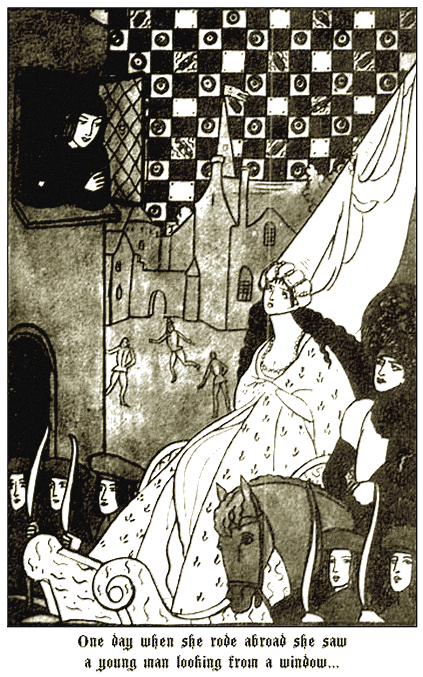
"This was no unusual sight, nor was the admiration in his eyes.
"But the Queen looked at him a second longer than her usual wont.
"And the next time she rode that way (it was near the 'Près aux cleves' and May, and very sunny weather) he was there again, and yet again until in all it was seven times she had seen him leaning from the window in the full sunlight looking down at her. The Duke François saw him; he saw the Queen look up and the young man look down, but he thought naught of it, so serene was he in his pride; could he imagine Isabeau would ever smile on one not of royal blood, or the greatest among nobles?
"So the Duke went his way, swaggering through Paris, and there came a day, about the beginning of June, the court being then at Vincennes, when the young man climbed the palace wall and dropped right at the feet of the Queen where she sat alone in the orchard, in the daisied grass, with her psalter on her knee.
"What followed was a miracle—you may believe what I say, though, for I had it from the young man himself: she rose to her feet—she was in silk from head to foot, with gold on her hair, and he in his ordinary garb, for he was no more than a student at the Sorbonne—and she held out her arms and came to him and they kissed without a word.
"They loved each other; from the first instant their eyes had crossed they loved each other. She had never loved before—not even Duke François; yet her pride was still the stronger, for although she was a woman utterly without shame she kept this love secret—had she loved a Prince she would have flaunted it, but this was only a poor clerk and all her wit and her power were turned to conceal her passion.
"For a while she contrived it—for she had all France at her service. and who was there to spy on her, or to dare to speak if they did, and of whom should she be afraid?
"There was one—Duke François—but in her pride and her absorption in her new love, and her great haughtiness, she disdained hint.
"She had dismissed him from her favour as lightly as she would have blown a feather from her sleeve, and his pride was sorely his and his ambition also. I do not know what they had ever been, the one to the other, but she had given him her confidence, and made him virtually King of France, from which he had soaring hopes and delighted in the power her favour left in his hands. But there came a time when she must needs consult him on some affairs of State that she was too idle to attend to or too ignorant to understand, and the Duke perceived in her the effect of advice not his own, and this angered him. For her personal coldness to himself he cared little enough, I think. He was as proud as she and as cruel, but neither so reckless nor so foolish. It was said he schemed to take the place of the poor silly King and would have stopped at nothing to this end, if he could have cloaked his design beyond discovery.
"He made no complaint now of the Queen's waning favour, nor of the daily humiliations she put on him—for she was not a prudent woman, and too proud to conceal a changed feeling; he served her ever with the same graceful readiness, but his courtesies only masked the fact that he was employing all his wit and skill in findings out his rival, so that he might be revenged.
"At first he suspected the princes of the blood, the court gallants—yet he wondered at her secrecy, and his careful watching and spying convinced him that it was not one of these who had taken his place.
"For a while he was baffled, for she was most careful—cautious and secretive for the first time in her foolish life—and she had not a single confidante...
"But the young clerk was also ambitious, and the excessive fears of discovery of the Queen had began to gall him; he thought that she might have brought him to court, and let him ride openly beside her in cloth-of-gold through the streets of Paris. Yet he dared not even suggest such a thing; for when once he hinted to the Queen that she might gild his obscurity she told him that did he once lift his head out of the crowd, Duke François would set his heel on that head and crush it into the dust. So he had to content himself with his secret influence on the affairs of France—he wrought diligently and skilfully on the evil little Queen, and she trusted him with the secrets of the statecraft of France, and he advised her and gave her long scrolls of parchment covered with what she must do, and she meekly obeyed him; it seemed in those days as it she would do all to please him—all and anything save own him.
"You might think that he would have been content, yet he was not, for she had made him take a great oath that never, no matter at what pass, would he disclose that the Queen had loved him.
"This oath rankled within him day and night, till he began to irk and fret at the concealment and to consider what he might have achieved had she set him beside her on the throne of France—of how he might have been bowed down to and worshipped by those people who now took him as naught and never turned their heads to look at him.
"So in all these three pride became the one thing burning up all other passions: in Duke François, angry pride had been supplanted, killing all lingering tenderness for the Queen, humbled pride in her began to dim her true ardour for her plebeian lover, and baffled pride in the clerk began to stifle the passion he felt for Isabeau.
"As the months rolled round to another summer this conflict of pride with the softer emotions of their bosoms became a thing unbearable to all three.
"The Queen had a secret door in her apartments in the Louvre, and when the nights were moonless, and her women dismissed, she would take her lantern and in some cunning disguise or other go forth, let herself out of the Palace with her own keys, hurry along the dark streets of Paris and meet her lover either at the 'Près aux cleves' where his house stood, or in the cemetery of the Couvent des Innocents, which stood open day and night. In this ghastly place they met not only for love, for the young clerk, in defiance of God and eaten up and maddened by pride, was seeking to raise the Devil or one of his emissaries, who, as he hoped, might help him to thwart the Queen and gain the place he longed for in the councils of France.
"And Isabeau helped in these experiments—her design, which she kept as secret as her lover kept his, being to obtain the aid of the Devil in safely removing Duke François, whom at last she was growing to fear.
"Perhaps a woman's instinct warned her that under his serene air of homage he might be working her fatal mischief.
"She was only afraid of one thing in the world, and that was the discovery of her common lover, and she knew that this very weak spot was that which Duke François would not like to strike.
"About the very heat and height of summer, when the war was faring badly (the English burning and slaying close within a hundred miles of Paris), the people bent beneath taxes heavier than any taxes had been yet even in the bad Queen's time, the harvest poor and rotting on the stalk, the air filled often with storms and the echoes of riots and rebellions and fierce punishments in Picardy and Normandy and Provence, Duke François, after six months of spying and watching, saw, with his own eyes, Isabeau go forth and meet a common clerk in the graveyard of the Couvent des Innocents.
"And then Duke François began to raise the Devil, too, after his own fashion.
"The nest day he was the Queen's courtier as usual, bowing and humble at her side, and she was more than ever haughty and cold with him, for his quiet presence and soft manners were becoming daily more intolerable to her and an affront to her pride—yes, an affront to her pride to look at him and imagine his laughter did he know her secret—his laughter at her, the Queen!
"But that evening she was relieved of him; he went to Acquitaine, where his estates were, on the excuse of a rebellion among his vassals, and that he must go to punish with sword and fire those who murmured against his iron government.
"But he left behind him strange rumours—it was said that Devil-worship and Devil-raising were going on in Paris, and that to these unholy dabblings in the black arts were to be traced the misfortunes and disasters overtaking France.
"The priests, who had been made desperate by the silence of the Blessed God to whom they prayed, and somewhat discomposed besides by the temper of the people, who began to complain of a scant return for all their ollerings in the churches, were eager enough to catch at these rumours and to encourage and inflame with Holy zeal the miserable citizens of Paris, who, in truth, between Queen Isabeau and the English required no Devil to plague them.
"In a short while the rage against Devil-worshippers and the search for them became so fierce in France, and especially in Paris, that Isabeau's lover was frightened and begged her to desist.
"But she was the Queen—she could not imagine danger and herself in the same company; she was infatuate in her study of black magic, and mad to raise the Devil and learn from him how to be rid of Duke François—and how to get money—for she had wrung almost the last mavaredi out of France and she was one who needed to be gorged on gold to live.
"She would not turn back, and so it came about that on one night in August—the fourteenth day of August—in the year '20, this scene took place in the cemetery of the Innocents.
"You may believe what I say, for I was there.
"It was a hot night, but thick, loose black clouds raced across the full yellow midsummer moon and the two figures crouched behind a gaunt tomb were sometimes in silver light and sometimes in complete darkness. One was the Queen and one the young student of the Sorbonne...
"That night she looked most beautiful; she wore a red 'coteardie' and black hose (she was habited like a man) and a short purple cloak and a purple hood drawn over her ebony hair—but no poor sentence of mine could describe the flash and sparkle of her face, the delicate carnation of her cheeks and lips, the velvet sweep of her brows, the shade and softness of her throat: she was a beautiful woman—beauty itself, sirs, the pure beauty of the flesh.
"They had made a horrid brew in an iron cauldron. There were loathsome ingredients in it, that the youth shuddered to handle, but Isabeau cared not; the cauldron stood against the tomb and round it were traced pentacles and mystic signs in white chalk.
"The Queen's white hands were busy in setting fire to the sulphurous mass that she had piled beneath the cauldron, when the moon sailed languidly free of the clouds into the clear dark ocean of heaven, and glancing up, she saw she had raised the Devil indeed; he stood beside the dark wall of the tomb in the guise of Duke François.
"She raised her hand to shield her face—she thought of that even before she turned to flee; but he seized her upflung arm and dragged it down and held her fast. 'Majesty!' he said, and in that one word she heard her degradation and realised, for the first time perhaps, the utter depths of her fall.
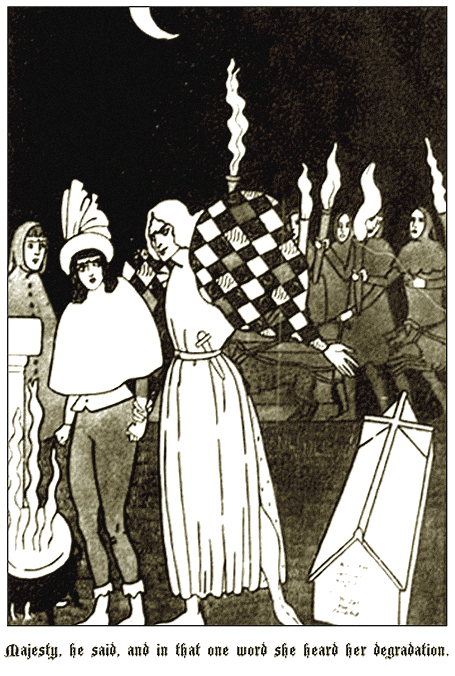
"For the moment sheer terror was uppermost; she appealed to his manhood the weaker to the stronger—an ancient instinct that had long lain dormant in her imperious soul, but it did not soften him to see her abasement; his pride was mounting as hers sank, he remembered how she had flouted him, and that this was his vengeance.
"He called up his men; they came hurrying across the graveyard.
"Here mark his devilry—they were all fellows he had brought from Acquitaine—who had never seen the Queen—and who beheld now nothing more than a couple of youths caught in the infamous and deadly practices of black magic.
"After them came a whole pack of the baser sort, carrying torches and lanterns and accompanied by several of those fierce dogs of the kind men take with them when they hunt highwaymen and night ruffians, and these, with the enthusiasm of the chase, and the delight of seeing the quarry cornered, and the hope that now the Devil-worshippers were caught the misfortune of France would cease, were beside themselves, leaping, shouting and pushing forward across the gravestones, and only held in check by the pikes of the Duke's men from Aquitaine.
"It may he imagined that though some of them may have glimpsed her golden chariot in the distance, none knew the Queen.
"And she stood with her back against the wall, facing them in the moonshine, so pale now compared with the angry red dancing light of the coarse resin torches of the crowd.
"As for the other youth, the student I mean, he stood numb and bewildered and frightened to death, yet (with the instinct to stand by the woman) staying where he was, though none held him. Isabeau looked up at François.
"'You must save me,' she said haughtily, and she signed furiously to her lover to leave her—but he, poor fool! did not understand and instead drew nearer to her, clapping his hand to his outmatched sword.
"Why should I save you, little witch?' cried the Duke in a loud voice, and he beckoned his followers nearer. 'See justice done to these two,' he said, 'who were so manifestly raising the Devil! What shall their punishment be?'
"And they shouted violently, 'Death'—and Isabeau cowered a little, and then looked at François again and saw what revenge he had prepared for her—she must declare herself before these churls or be done to death by them; there was no pity in Duke François—she knew it in an instant.
"I think that in that instant, too, she had taken her resolve. Pride is a deadly sin, but always a brave one.
"She folded her arms on her bosom and looked sideways at the mob, who ever pressed nearer with shouts of hatred.
"'Tell them who you are,' said the Duke. 'Give then, sweet, your name and quality.'
"She shot a glance up at him and hell-fire flashed in her eyes; she said nothing. He swung her round to face her persecutors. At that the student sprang forward, hardly knowing what he did—or what had happened. 'Whom do you touch—do you know who this is?' he cried, himself not knowing who Duke François was. But the Queen turned on him with all she knew of royalty in her looks and gesture.
"'Silence!' she commanded, 'or I curse you!'
"He fell back at that and was seized by the Duke's guard. He hung his head, he had no great desire to speak, nor for anything on the earth, for he saw that her love had vanished in a flash—that she thought no longer of him...that she was the Queen now, and no longer his lover...
"'Speak!' cried François. 'Will you not speak?'
"Surely he had never believed she would carry it so far...but her sole answer was to laugh.
"She stood full in the moonlight, a small figure, but dauntless; she slipped the royal signet from her finger and dropped it into the rank grass—she had only to show it to gain instant safety, remember.
"But she set her foot on it instead, and laughed at François.
"He had cone to shame her and he saw she was minded to baulk him, and in his rage and his fury at the sight of pride carrying her so far he stepped aside and with a gesture offered her to the rage of the crowd.
"His men lowered their pikes and the people surged forward—little knowing on whom they were wreaking vengeance at last.
"And she slid not speak...she put her cloak before her face and set her back against the tomb.
"And so died the Queen of France; when the crowd had finished with her she need not have feared recognition.
"Her tattered corpse was flung into a ditch—and the Duke rode over it when he left the graveyard; maybe some of her blood was on his horse's hoofs.
"At least he respected her pride; it was given out that she was dead of sudden fever, and there was a gorgeous funeral—with a gorgeous doll in her place, while her bones were nosed by swine.
"The student escaped," added the monk, "or how should I be telling you this?
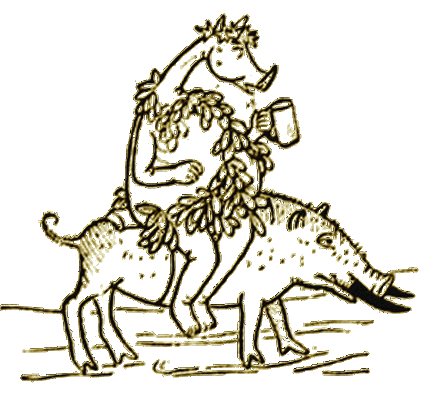
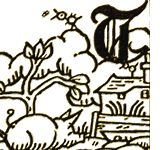 HE monks were in the garden gathering the herbs for
the distillery where their sweet wines, potent spirits and fragrant
perfumes were made.
HE monks were in the garden gathering the herbs for
the distillery where their sweet wines, potent spirits and fragrant
perfumes were made.
The four arcades of the cloister encompassed them, slender red-brick arches with the head of an angel in white glazed pottery above each group of clustered pillars.
Overhead the sky was summer blue, against which rose the graceful height of the campanile; the monastery stood on a hill covered with fruit gardens, vineyards and cornfields, and was reached by a toilsome, winding road, so that it seemed very far from the world indeed, more than half-way to heaven, if heaven was as near as the monks believed.
The square garden in the midst of the cloisters was on the very summit of the hill and in the very centre of the buildings; it was divided into four parts—the herb garden, the flower garden, the fruit garden and God's garden, which was the graveyard, and grew neither herbs nor fruit nor flowers, but only little rusty iron crosses above the roughly turned sod.
The four divisions were marked by broad, low box edges bordering pleasant paths, and in the centre was a white alabaster well on four white alabaster steps; the ropes and buckets hung from a light iron framework, and round about, in the crevices of the slabs, grew maiden-hair fern and the small, odourless Italian violet.
In the flower garden were roses, carnations, syringa, freesia, stocks, wallflowers, lilies in bloom, and jasmine, magnolia, gardenias, oleanders and myrtles still only covered with green; in the herb garden grew bushes of lavender as high as a man, tufts of sweet basil, thyme, pepper, mint, clove, citron, mustard, camomile, ginger, fennel and iris.
The fruit garden was shaded by fig and pear trees; beneath them grew currant and gooseberry bushes, orange and lemon trees, raspberry canes and strawberry beds.
There the novices were walking with Father Aloysius.
In one corner of the fruit garden was the fish-pond, and some of the novices sat on the brick rim and ate figs.
They ate one for the Eternal Father, three for the Holy Trinity, one for the Virgin and seven for her seven sorrows.
Father Aloysius ate ten for the ten Commandments as well, and then twelve for the twelve Apostles, for the figs were just ripe, soft and green and gold and purple, creamy white and deep rose-pink inside, with a perfume, faint indeed and evasive, but delicate and seductive enough, as Father Aloysius said, to tempt Saint Anthony.
And he ate seven for the seven active virtues, and seven for the seven theological virtues.
Then he began to talk of the sin of Gluttony or Greed, as it is called in the rude tongue, but in the classical Gula.
Now Gluttony, or Gula, is the second deadly sin, said the monk, and is unlimited indulgence of the body, as Pride or Superbia is indulgence of the mind; and whereas from Pride spring many minor sins, as Disobedience, Hypocrisy, Impudence, Arrogance, Impatience, Irreverence, Strife, Vainglory, Spite and Swelling of Heart—for indeed Pride is the very root of all the sins—so out of Gluttony come various other sins, as Sloth, Selfishness, Sourness, Discourtesy and Witlessness—it is, in fact, a very ugly and horrid sin, and directly against the commandment of God. He who is a slave to Gluttony may not well withstand any other sin, and certain it is that no glutton was ever vet a saint.
The novices continued to eat figs as they drew round the fish-pond to listen; they sighed at the wickedness of the world and smiled to think how safe they were from it.
Now as Pride, continued Father Aloysius, is shown in the figure of a peacock with a crown and a beautiful coat, who thinks of nothing but how he may display himself, so is Gluttony shown in the resemblance of a pig, which is a very unpleasing beast, bare of adornment, composed of naught but flesh, with a great nose and mouth always searching for food, and a body so fat his legs can scarcely support it. When he can find nothing to eat he sleeps, and he has no wits at all, and no disdain of dirt or filth, but rather delights in it; his voice is rough and harsh, and he hath an unlovely odour. As this beast is, so is the glutton, for ever followed by contempt and laughter, the pointing of fingers and the shooting of lips.
Indeed it is doubtful if there be any sin which is so disdained as this, for a man may not be a glutton and keep his dignity, nay, he may not be a glutton and save his soul alive, though of most other sins this is possible—with submission to Holy Church. Now how this second deadly sin, which is the ugly sin of Gluttony or Gula, may directly lead to a miserable end in this world (to say nothing of what punishment is in store in the next world, the which is only known to the wrath of God and the ingenuity of the devil), is shown in the story of Denis D'Espagnet, who was a merchant of Marseilles in France, and at first a very personable young man, albeit always given to this sin of Gluttony, though it must be admitted that he had no others, at least none that were noticeable: but, as I have said, this sin sufficeth.
He had a very noble and princely fortune, a fine mansion in the town, and many ships in the port; but it must not be supposed that it was a fortune of his making, for what glutton was ever industrious? It is against nature.
It was his father who had made and left all this wealth, for he was a very thrifty and wise merchant, and generous and courteous withal.
He dealt with the East, with Algiers, with Barbary, with Turkey, India and China, and he brought gold and silver, ivory and spices, silks and jewels, perfumes and porcelain, strange birds and animals and cases of fruits and sweetmeats; and his fame for his fair bargaining, his great wealth and his high connections, was great. He lent money to Princes, to the King of Cyprus, the Doge of Venice and the Pope of Rome.
The King of France was in his debt, and, being willing to favour him, stayed under his roof before he sailed from Marseilles to fight the heathen.
It was winter weather, and in the royal guest's chamber burnt a great fire perfumed with cascarilla, and while the King stood before it, warming his hands, D'Espagnet cast into the flames all the King's bonds for the money he owed him, thereby setting him free from the burden of his debts; so that this fire cost many thousands of gold pieces.
Now it is manifest he would have done better to have made the King pay his just debts and have given the money to Holy Church, but this was the action of Hilaire D'Espagnet, and fine and princely it was considered.
But his son was a different man: he thought nothing of gaining money nor of spending it, but only of this ungodly sin of Gluttony.
His feasts were famous in Marseilles, nay in all France, for at no other table could such delicacies be found as at his.
From all over the world came the meat, the game, the fish, the fruit, the vegetables on which he fed, the rare and costly wines which he drank.
A hundred cooks were kept busy day and night devising new dishes, and the master cook had the wage of a king's general, and wore round his neck a gold chain, one link of which would have ransomed a lord.
There were brown cooks from India who looked to the making of spices and sauces, yellow cooks from China who held the secret of many strange recipes unknown in Europe, French cooks for the pastries, Italian cooks for the creams and jellies, German cooks for the baked meats and the mulled beers, Spanish cooks for the chocolate and the game, Persians to mix the sherbet and the fruit drinks, and two English cooks to make what they call in that country "rosbiffe," "biffstek" and "plumpouding."
In his garden were great tanks full of trout and crabs and lobsters, trees laden with fruit—and many growing under glass and kept warm with fires in the winter, that he might never lack all the year round.
There were huge beds of lettuces, asparagus, tomatoes, onions, radishes, artichokes, fennel and marrows in the places where his father had had roses and carnations; these were all uprooted now, for nothing might remain in the garden which was not good to eat.
He had two hundred men looking after these things, a vast yard where he kept fat fowls and ducks and pheasants and herons and peacocks, and a plot of cabbages on which great white snails were fed; the Chinese cooks could make wonderful soups out of snails.
He neglected his business, he had no liking for the company of ladies nor for the converse of friends, he went from his bed to his table, and when one meal was ended he sat on cushions and thought of the next, or, to get an appetite, he walked round the garden and admired the juicy fruits and the succulent vegetables, and the fat birds waddling up and down.
And there was one dainty he loved more than another, and that was citron pie. A plain and an ordinary thing, said Father Aloysius, it may sound to you, but you must not think of citron pies as you may have seen them, with a sodden crust and pulpy fruit within—nay, these pies, as made by the master cook himself, were very different.
They were no bigger than a lady's palm, the crust was so delicate you could blow it away. The centre was a perfect ripe peach, and over that a jelly of strained strawberries, over that whipped cream mixed with violets, and round about all a circle of snow flavoured with slices of citron, the whole enclosed in a silver filigree basket, frozen and sprinkled with jasmine buds preserved in sugar.
Such were the pies that Denis D'Espagnet prized above all sweetmeats; he even began to write verses in their honour, but was too lazy to do more than the first line.
He lived in this manner for several years after his father died; his fortune diminished through neglect, but he did not care, for he still had ample for his food, and his person became fat and round so that a piece the shape of a half-moon had to be cut out of the table at the place at which he sat; but he made no trouble of that, and lamented not at all his lost comeliness, but lived contentedly until one day (a fatal day for him!) a fellow-merchant, who had been one of his father's friends, came to visit him, and Denis made a feast, and the hundred cooks worked all day and all night, for the other merchant was not wholly free from the deadly sin of Gluttony. After the feast, which lasted three hours, the master cook himself brought in the citron pies, and Denis placed two of them on the plate of his friend and waited with complaisance, for he knew well enough that there was no excelling these dainties in the length and breadth of the world.
The friend tasted them.
There was a pause.
Denis still waited for the usual sigh of rapture; lie waited so long that the master cook paled, thinking he had forgotten one of the ingredients.
"Well enough," said the merchant at length. "But not like those I have eaten at the Court of the Khan of Barbary."
Denis trembled like the quince jelly before him, and the master cook burst into tears; it was the first time either of them had heard such heresy.
"Something is lacking," continued the friend. "I know not what—nay, I cannot fix the flavour—but something is hopelessly wrong. If you were to taste those made for the Khan—ah, then you would know the difference!"
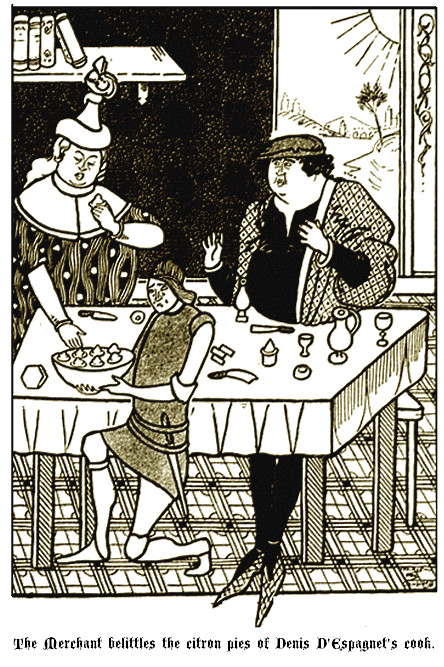
So the feast ended dismally, and that night Denis could not sleep for thinking of the citron pies made at the Court of the Khan of Barbary.
And the next day, before his friend departed, Denis begged and besought him by some means to procure for him the recipe of these same tarts.
But the friend laughed and said that the only Christian who had ever gone into the Khan's kitchen had come out as a pie himself—a great pie which had been served at the supper of the Prince's lampreys.
After this, life was spoiled for Denis; he could think of nothing but those pies, more perfect than his own, being eaten daily at the Court of the Khan.
The master cook, too, fell into a melancholy and became careless, and once a pheasant came to table with the upper side browner than the under, and a peach was served with a speck in the skin.
Denis began to take no pleasure in his food, he lost flesh, he brooded, and at last he resolved to go to Barbary himself, visit the Khan, and taste the pies with his own lips and tongue.
Greatly he groaned at the exertion, for never yet had he left Marseilles, but his ruling sin conquered; one of his galleons was prepared; he took the master cook with five under him, great store of food and wine, two friends, a skilful captain and a sturdy crew, and set sail for Barbary.
Now he had hardly got to sea before his troubles began, for the rolling of the ship begot in him a sickness so that he groaned and cried for very unhappiness, and all the captain could do with the telling of witty tales did not serve to cheer him.
The cooks were ill, too, and there was nothing to eat save the ordinary ship's rations which the sailors could prepare; but for once (for the first time, indeed) Denis did not think of food.
The captain told stories of the journey to Samarkand and of the tomb of Timour Beg, built of stone green like water, of the camels crossing the desert with nets hung with silver bells over their packs, of the wild and curious beasts he had himself seen, such as the manchora, whose teeth fit nto one another like combs put together, who has a blue body, the feet of an ox, the face of a man, and a trumpet-shaped tail whereon he blows, making a fearsome noise; Denis, however, gave no heed to these marvels, but lay and lamented.
But on the tenth day they sailed into smoother waters that were clear as an emerald, and one leaning over the ship's side could see the terrible sea-beasts at play, and the pearls and coral and amber, ready for the gathering up.
Denis had no taste for these things, and begged the captain to put back to Marseilles; but his friends overruled him, saying that they might get to Barbary as soon as they might get to France.
Yet it had been well for Denis if he had had his way, for on the twelfth day up came a great sea-rover with black sails, and quickly made captive the French galleon.
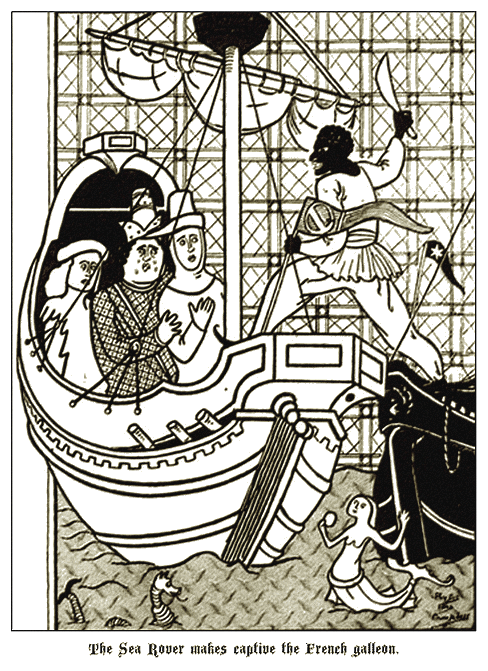
Now it chanced that this rover was from Barbary, and the Marseilles captain explained that they were peaceful people and honest traders, and that his master was on a visit to the Khan himself.
But this availed them nothing, for the Barbary captain told them that his Prince was so vexed by the attacks of the King of France upon various heathen Princes who were in league with him, that he had himself declared war against all Christians.
Whereupon Denis proclaimed his name, which was a great name and well respected in the East; and when he heard it the heathen leapt for joy, for, said he, it is well known that that is the name of the Christian who lent the King of France money that he might war against the Mussulman, and the Khan will be greatly rejoiced to have him as a prisoner.
Denis with many tears and cries declared that he was not responsible for his father's work, and that he had never lent a maravedi to a single soul—but what availed that?
He and his friends and the cooks, the captain and the crew, were bound and put in the hold, and the rover made all haste to Barbary, where he delivered his captives to the Khan.
The cooks (alas for the frailty of human nature!) turned Mussulmans and so were taken as slaves into the houses of rich heathens; but Denis and his friends and the captain were staunch to the true faith, for they were never asked to forsake it; they were lodged in the royal prison, and the crew were sent to the royal galley; it is quite plain that the blessing of Heaven was not on that voyage.
These unfortunate Christians were cast into a miserable dungeon that looked into the Khan's garden: the window was no bigger than two hands put together, the walls were rough and the floor was clamp, and once a day bread and water were given to them, so that they sat and bewailed themselves.
But his guardian angel had not forsaken Denis, and still contrived to give him a chance to save his soul alive and die in penitence.
The Khan's daughter was in the garden among the lilies when the captives were taken to their prison, and she chanced to fall in love with Denis, who had become comely again, his flesh having shrunk from lack of food and misery.
Stout he still was, but fat is admired amongst these heathen, and the maiden herself was named Full Moon, because she was round and white, having been fed on butter to make her plump and bleached to make her fair.
Now the Khan went away hunting, and on his return intended to have the prisoners impaled to celebrate his birthday; but the maid was cunning enough, and with tricks and bribes she got the sentries away from the prison, and down she came one evening, veiled, scented with geranium and wearing a petticoat of gold silk, a petticoat of white satin, trousers of silver gauze, and all manner of gems and chains of gold and silver, and she put her face to the window and cried softly, "Denis!" (for she had found out his name) "Denis!"
He, hearing the voice and fearing some heathenish trick, desired the others to answer, but they would not; and presently he went himself, trembling with fear.
But when he fixed his face in the window and saw the Khan's daughter he smiled, and she lifted her veil and sighed.
Denis, being desperate, made love to the lady. He praised her figure and her face and her kindness (it is true that she was much to his taste)—and presently he asked for some food.
She stood on tiptoe and kissed the end of his chin (she could reach no further, neither could he get his head out of the window), and promised to return with meat and drink.
And now the other prisoners clamoured to know who it was, for they could see nothing; and Denis, willing to keep his good fortune to himself (for what is food for one shared among four?), said it was the sentry telling him the Khan was away, and that when he returned they would all be impaled; then when they were again asleep he went to the window and waited for the Princess.
Faithfully she came, and brought with her a basket and handed up to him baked meats and roast game and almond cakes, fruit and iced sherbet, till the tears of joy ran down his face.
And while he ate she told him that she had a scheme for his escape, that she would become a Christian for his sake and they could fly away together to his country. Meanwhile she promised to come every night and bring him food.
And so she did, and never a drop or a crumb did this glutton, for lust of his sin, share among the others, though he got daily fatter and fatter as they got thinner and thinner.
Strange looks they began to cast on him, for, they said, it is strange that he on bread and water should become again fat and round and soft, even as he was at Marseilles.
But he declared it was the grace of God sustaining him because he said the Pater Noster every night, and as his guardian angel saw to it that the Princess came only when they were asleep, they were forced to believe this, though no flesh grew on their bones even if they said their Pater Noster thrice over.
One day Denis recalled the whole aim and purport of his visit, and, quivering with excitement, asked Full Moon to bring him some citron pies such as were served at her father's table.
The next night she brought them, twelve of them on little plates of saffron yellow porcelain...
And Denis admitted that they were indeed better than those made by the master cook, and every day he ate them and became fatter still, for the pies were full of cream and butter and egg. So things went for a month, and then the Princess told Denis that all was arranged. She had contrived to steal the keys of the prison, and of the garden, she had swift horses prepared to carry them to the sea, and she had his galleon, all manned with Christians ready to take them to France.
To celebrate the news Denis ate five-and-thirty citron pies.
Now the next night, while the others slept, he sat waiting for the maiden to open the door, and never a thought did he give to these unfortunates, who were in mortal danger of death through him and his nasty greed—for why had the journey been undertaken but for his gluttony?
The time passed, the ivory moonlight was pouring into the cell, the bulbul was singing outside, the rustle of the tamarisk and the pepper tree filled the air, and presently the door was softly unlocked and the Khan's daughter stood before him, wrapped in a black veil, and carrying such of her father's jewels as she could find, tied in a scarlet cloth.
Up sprang Denis, and she whispered to him to Haste! haste! for the Khan was returning that very night.
Haste he made indeed, but nothing did it avail him; for see the horrid consequences of this ugly sin of Gluttony or Gula, see the judgment of Heaven on this wretched sinner!...
He could not pass the door.
Yea, so fat and large and gross and heavy had he become that there was no getting him through that narrow door, either sideways or frontways or backways—the Princess stepped into the garden and pulled, he heaved and puked till the sweat ran down his face, but it was useless: not even half of him would pass.
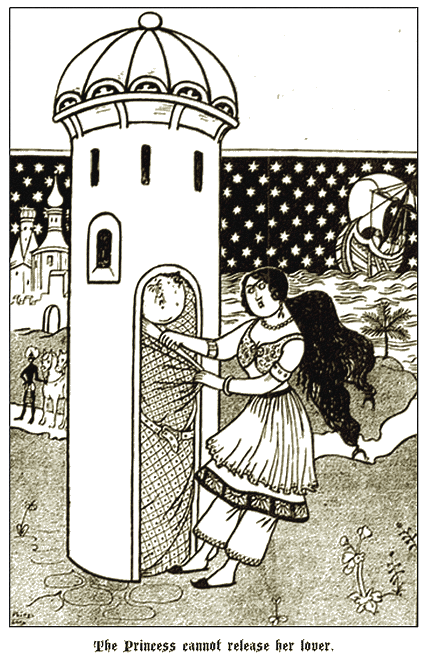
His groans and moans awoke the others, who quickly dragged him back into the cell and stepped into liberty themselves.
The Princess, seeing this, began to shake with fear and would have run back to the palace had not at that moment one of her slaves come panting up, saying the Khan was home.
Then the maiden, realising how desperate the case was, and being vexed with the great fatness of Denis, besought the three other Christians to escape with her, telling them of all her preparations.
Whereat they came right gladly: the captain and the Princess mounted on one horse, and the two friends on the other, and they thundered through the white town and the blue night down to the sea, where they found the Christian vessel and so were saved, together with the other poor souls, to the great glory of God.
Full Moon married the captain, who came into all the possessions of Denis, for he, in the great fear and terror of his first days at sea, had made a will leaving all his money to the captain if he brought him safe to land; and sure enough, the captain said, "I did bring him safely, or would have done if the heathen had not captured us."
Meanwhile Denis groaned and moaned in the prison and struggled to get out of the door—but what was the use? His guardian angel was tired of this sinner.
The Khan heard these cries and came to the prison...Ah, he was a wrathful heathen when he found that his daughter had escaped with all the Christians in his dominions.
No use were the cries and entreaties of Denis: the Khan's master cook entered the cell and dispatched him, and in several portions they conveyed him away to the kitchens; flavoured with bamboo shoots and mustard he fed the Khan's lampreys for a week.
So you see, added Father Aloysius, the result of this horrid sin of Gluttony.
Clearly enough the novices saw it; they sighed and shook their heads.
Then, as they had eaten all the ripe figs, they all went into the refectory to supper.
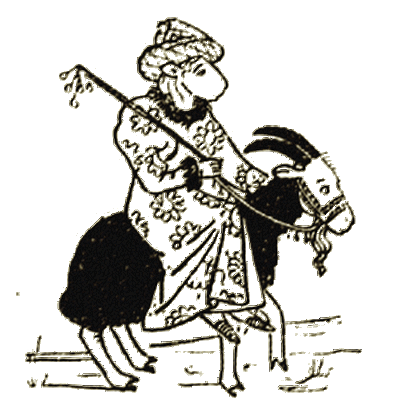
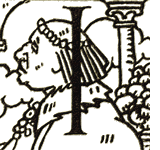 T was the middle of October; the chestnut trees in
the valleys, the olive trees on the hill-side were heavy with fruit; on
the sloping roofs of the cottages the figs were placed to dry; the gold
and scarlet leaves of the vines hung shrivelled, and the grapes, purple,
yellow, green and rose-coloured, were revealed clustering to the bare
poles; the oranges and lemons hung green as jade amongst the fresh
foliage; in the garden scarlet flowers bloomed and tall spears of
tuberoseloysiusay long the sun shone warmly, but at night there were
heavy rains, and the winds were chilly in the shadows.
T was the middle of October; the chestnut trees in
the valleys, the olive trees on the hill-side were heavy with fruit; on
the sloping roofs of the cottages the figs were placed to dry; the gold
and scarlet leaves of the vines hung shrivelled, and the grapes, purple,
yellow, green and rose-coloured, were revealed clustering to the bare
poles; the oranges and lemons hung green as jade amongst the fresh
foliage; in the garden scarlet flowers bloomed and tall spears of
tuberoseloysiusay long the sun shone warmly, but at night there were
heavy rains, and the winds were chilly in the shadows.
While the monks worked in the distillery the novices made the wine, and Father Aaloysius directed their labours.
The big barns outside the convent were filled with vats into which the novices trod and pressed the grapes. The brown fingers and the brown feet of the novices were stained a dull red, red also were the butts, and rivulets of red ran in and out between the square paving-stones of the courtyard.
Hot and tired were the novices; the vintage was nearly over, and the wooden taps began to yield the bright liquid of the fresh wine, while the drained niasses of bloodless grapes were thrown into the garden, where numbers of pale wasps devoured them.
The novices were discontented as well as tired; the Prior was entertaining a certain Prince, on his travels through the country, and all day long his knights and squires went to and fro the gardens and courtyards, holding their noses because of the smell of the fermenting wine, and raising their skirts and mantles out of reach of the trickling lees.
The novices marked them, marked their air of contempt, their scornful laughter, their sniffs and puckerings of brows and lips, marked also their garments, the nets of gold and silver on their heads, their hats with green and blue feathers, their mantles embroidered with silk and woollen, their curious boots, tasselled gloves and wonderful daggers; and because of all this, and because they were labouring in rough brown habits, they became vexed at their vocation and wishful that they, too, were in the world.
And they were still further discontented when two of the knights, seating themselves on a low pink stone wall over which the last roses poured their yellow blossoms, began discoursing lightly of holy things in a loud tone, so that the monks working at the vintage could not fail to hear.
And one knight told the other a story of a certain sinner who had gone to Rome to see the Pope.
His Holiness was in his palace of St. Giovanni in Saterno, and he received the penitent in the garden.
It was springtime (said the knight), and the square of garden between the white marble cloisters was planted with violets—nothing but violets—and in the centre was a small fountain of alabaster from which trickled water as clear and sparkling as a diamond. Near this fountain the Pope was walking, and so humble and pious was he that he wore the robe of an ordinary monk and was telling over a string of white beads, each caryed from the bone of a saint.
Now when the penitent entered the garden he felt afraid and uneasy—he knew not why: afraid as if he were in the presence of something horrible—uneasy as if in the presence of something eyil.
The penitent thought it must lie with the violets; there were so many of them, and the enclosed scent of them was so strong as to make the head giddy.
Albeit, he told his sin to the Pope and was absolved.
But even as he was leaving he turned him back and said: "There is one thing more, Holiness, I have often wondered at: how can one know a damned soul?"
"A damned soul?" repeated the Pope slowly.
"Even so—is there no sign by which one can tell it? I have asked many people, and they all have said, By a certain red light in the eyes, a reflection of hell fire. Is this true, Holiness?"
"How can I tell if it be true?" answered the Pope, and he stooped for his rosary, which he had dropped.
So the other made his reverence and was for leaying, but as he passed through the shade of the cloisters, he chanced to glance back.
The Pope was looking in his direction, and the eyes of his Holiness glowed red as a coal from the Pit—red, red and shining with flame.
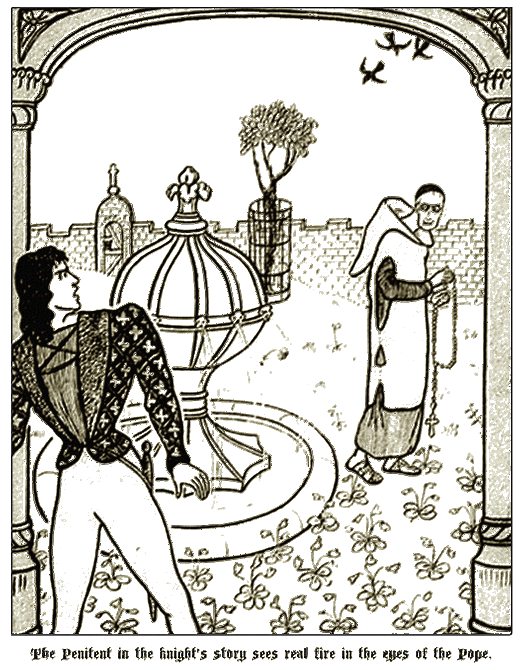
Then the penitent turned and fled, and ran, and ran, and ran, because of the horror that was on him, until he came to the Tiber, and there he threw himself in and was drowned, for no one may see such a sight and live.
And when the knight had finished discussing this story, he and the rest moved away laughing.
Now at this moment up came Father Aloysius to taste the wine, and to him the novices recounted the tale they had heard told by the knight.
Make no account of that (replied the Father); now is his time, and he may levant and flourish in his impiety and wantonness: but the time will come when the Devil and his imps will snatch him away by the yellow hair of which he is so proud, and for all his cries and lamentations the saints and angels will take no heed of him.
I perceive (continued Father Aloysius, seating himself on the pink wall) that ye are discontented on beholding all the splendour of these knights.
But I tell you that Luxury—or Luxuria, in the classical tongue—is the third of the deadly sins. I have already told you of Pride or Superbia, Greed or Gula, and what comes of them; and now I will tell you of Luxury or Luxuria, which is given under the form of a goat, a creature of unbridled desires, as deaf to the voice of man as the sinner is deaf to the voice of God, and one of the symbols of the Evil One himself—he who sees an ape riding on a goat has certainly seen the Devil riding his favourite steed.
There was once (said Father Aloysius) a young man whose father kept him very straitly: every day he Went in frieze, a suit of four years' wear patched and darned, and for the winter a collar of red fox from which all the hair had fallen.
No natural joyance or pleasure of youth was allowed him; when the other young men went out to the games, or to see the horse-racing, or the Morality in the public square, he had to remain at the window of his father's great dark palace and watch them with longing eyes.
When the young maidens went out to the fields beyond the city to gather the first flowers of the spring, he was never among the cavaliers who escorted them; when they returned with round bunches of roses, red and white, and long boughs of hawthorn, it was never to him that they offered favours taken from their posies—no, for him there was nothing but the passing glance, the light laugh or the smile of pity.
There was poor food in the palace, though it was served on heavy silver; there was thin wine in the glasses, though they were cut crystal; there were worn coverlets on the beds, and the moth had eaten the damask hangings, and dust had tarnished the gold thread of the armorial bearings in the tapestries.
For the father of Giulio (such being the name of this most unfortunate young man) was held body and soul by another deadly sin—that of avarice.
But when he was not very old he died, leaving behind him as much wealth as would have bought twice over the city in which he lived.
He left no heir but Giulio, and that youth now found himself, from a position of humiliating poverty, the most wealthy person in the land—which is to say, the most envied, the most admired, the most courted.
Everything was now changed in the old palace. Sculptors, painters and architects worked day and night to beautify it; the ceilings were soon covered with pictures like glimpses of Paradise; the walls were inlaid with precious marbles, yellow, black, white and grey; in all the dusty corners, hitherto known only to the spider, hung silken draperies of scarlet and crimson; the gardens, so long lifeless and parched, bloomed with the oleander, the palm, the orange, the camellia and the rose; the dried basins of the fountains were replenished with crystal water in which swam golden fish; the weeds were cleared from the lake, which now bore on its pellucid surface swans white as spring blossoms.
The worn, tattered furniture disappeared, and in place of it the palace was set out with chairs and tables of rare scented woods, inlaid with ivory and ebony; with couches covered with satin cushions; with sideboards hearing dishes and goblets of rock crystal, of agate, of sardonyx, painted lustre plates and tall glasses coloured like milk and rubies; with carpets of Persia, a thousand hues mingled in their silken woof; with tapestry from Arras, stiff with thread and gold.
And the stairs that had been so silent now echoed the sound of gilt shoes, the swish of trailing mantles, the clatter of swords, the rustle of silk; and the rooms which had been so long empty were filled with perfumee and sighs and laughter and gentle breaths and the wind of fans.
Giulio was transformed; instead of a doleful youth shrinking in worn homespun, he was a splendid young man, robed like an Emperor's son; he was gay, he was witty, he was generous—and, naturally, he was very much loved.
Never had the town known such gaiety. Every night there was a festival; every day there was a hunt, a tourney, races, games or some such diversion. It was as if a shower of gold had been poured over the place: the miser's money was in everyone's pocket, the praise of his son on everyone's lips.
Now this was a merry life for Giulio, and never did he pause to think of aught save this world, nor did he bestow a single penny on good works.
Nay, every holy monk who came to his door, begging the crumbs for the poor, was sent rudely away. "When I was in misery," said Giulio, "no man came to my aid, and now will I help no one, nor will I haye about me these miserable fellows, but rather those with bright looks who amuse me."
So his life went for a year or so, and during this time he had not once entered a church, or given money to the poor, or even laid a bunch of flowers before a wayside shrine—costly lilies and roses he would throw beneath the feet of some foolish woman, jasmine and camellias he would twine in her hair; but he could not spare even a cluster of wild violets for the Mother of God.
One day in full summer-tide, when Giulio felt suddenly and strangely weary of all his joyous companions, he chanced to find himself alone on the road some miles from the city gates; he was separated by the chances of the chase from his fellows, and not sorry to be alone. Nevertheless, he felt both hungry and fatigued; and as he had lost his way to the meeting-place, it seemed as if he had no chance of sharing the sumptuous collation his servants had prepared.
A storm was coming up; the sun shed a strong gold light from beneath a mass of purple cloud; the russet chestnut trees that filled the valley were half in violet shadow; a little wind cast the white dust up from the long road.
Turning a corner, Giulio suddenly saw before him a little house which stood back from the road in a herb garden.
The road was familiar to Giulio, but he had no remembrance of this house; indeed, so astonished was he at the sight that he reined up his horse and rubbed his eyes. There it was, clear enough—a square white house standing full in the sunlight.
And in the garden a man in a dark-red robe was picking herbs. He carried on his arm a flat basket of withes full of lavender, basil, marjoram, saxifrage, vervain, citronella, clove, camomile and rue, the mingled odour of which made the air peculiarly heavy, fragrant vet sickly; and as Giulio looked, he wondered at the great size and beauty to which these herbs attained. There were no flowers in the garden, only these tall, blossomless green plants.
"Friend, who art thou?" asked Giulio; and the man in the red robe looked up from his work.
"Oh, I have all manner of names," he answered pleasantly. "We are old acquaintances, Don Giulio, and presently shall know each other better still."
The young man felt horribly afraid; he did not like the storm which was blowing up across the valley, nor the sunny white house, the long white road, the man who was working there; all seemed to him as strange as some bad dream from which lie would be indeed glad to awake.
"Will you dismount and rest a little?" asked the herb-gatherer.
"Nay," said Giulio hastily. "I must endeavour to find my companions."
"Will you take some fond and wine?" offered the other.
Giulio shook his head and made to ride on, but his horse would not advance.
The man in the dark red habit came and leant on the fence; the purple clouds had now overspread the whole sky. "You are very anxious to leave me," he remarked. "Why in such a hurry to get away now? One day soon you will begin to spend eternity with me."
Giulio's heart knocked against his side, his face went white as paper, and his hair rose on his head. "You must," he groaned, "be the Devil."
"Certainly," replied the personage, leaning on the fence; "and we shall meet again very soon, Don Giulio."
"No!" shrieked the young man. "I defy you, I defy your arts! I am a Christ-born child. I defy you!"
"So they all say at first," returned the Devil. "But it is not the least use. The next time you pass this little garden of mine I shall have to ask you for the pleasure of your company."
With this he bowed very courteously and turned away, and the storm broke, blotting out the landscape with rain and darkness, and Giulio's horse bolted with him along the white road, nor stopped until he reached home, covered with foam and shivering with terror.
Giulio was also frightened. He tried to forget what he had seen and heard, he tried to believe that it was all a dream or a delusion, and more eagerly than before he filled his days with riotous living and surrounded himself with noisy and extravagant companions; but, as indeed Diabolus himself had warned him, it was no use, and in his heart Giulio knew it was no use; in the middle of the feast he would suddenly sec before him the sunny house and the herb garden, in the middle of the night he would wake up and see the figure of the personage in the red robe.
At length a day came when he could bear it no longer—he confessed to a priest and prayed for his advice; but the holy man shook his head and told him he could do nothing for him. Then a deeper terror possessed the young man; he became gloomy and thin, and careless of his former pleasures; and one day he mounted his horse and rode to Rome and threw himself at the feet of the Pope.
His Holiness was very, very old, and quite tired of life; he sat in a little black chair near a sunny wall, and the little lizards ran over his gilt shoes, so still he sat. His calm was like medicine to the distraught soul of Giulio, and there, kneeling among the daisies, he told his tale. When he had finished the Pope remained still a long while, thinking.
Then he said, "My son, there is only one way in which you can save your soul from the Father of Evil. You must build, to the Glory of God, a complete church. Complete. Not a brick must be lacking. Inside and out it must be inlaid with coloured marbles; every altar must have a painting above it; every image a lamp swinging before it. Adjoining must be a convent for the holy monks, a baptistery and a campanile. There must be a great garden for the comfort of the brothers, a fish-pond, an orchard, a vineyard."
When the Holy Father had got thus far Giulio interrupted him. "All this," he said dolefully, "cannot be accomplished in the life of one man."
"But you, my son, have exceeding riches, and riches can do more than life."
"But it would take all the riches I possess," complained the young man.
The Pope smiled. "All the better for your soul, my son. You will no longer be able to dissipate your days with riotous companions, but must spend your time in contemplation of the Holy Edifice you are erecting; and when it is finished and the last stone is in place, and the lamps all lit and the incense burning before the altar, then, then alone, you will know that your soul is saved and that you can defy the Devil."
Giulio considered. "Is there no other way?" he asked at length.
"No other way," nodded the Pope. Giulio turned to go, and before he had left the garden His Holiness was asleep in the sun.
The young man returned to his native city; he called together artists, sculptors and architects; he bought a piece of land on a high hill outside the town walls, and the church began to be built, the gardens to be laid out, the orchards and vineyards planted, the convent walls to rise up, brick by brick.
"So I defy the Devil," thought Giulio, and this prideful idea that he was setting himself against the Evil One so possessed him that he forsook his former extravagant ways and lived modestly, and thought only of the church and how it night be finished swiftly and worthily.
And whereas before he had been a mere object of wonder and amazement, and the beloved of vain fools, now he was praised by the good and the poor, for his church was becoming the wonder of the country, and the building of it gave employment to hundreds of artists and thousands of masons.
Ten years went by and the church was nearing completion, so lavishly had Giulio spent his fortune and so diligently had the workmen laboured.
One morning in spring Giulio rode out of the town to the sea-coast, and, sitting idly on a grey rock, watched the sea.
It was early morning, and the sea was a dim colour betwixt gold and silver, the misty blue of the heavens was veiled with faint pink clouds, and on the horizon gleamed a great golden argosy.
Now, while Giulio was idly gazing at this distant ship, which looked like a flower fallen from heaven, and idly wondered what port it had sailed from and to what port it was bound, he heard the sound of gentle but very desperate sobbing.
All amazed he sprang up and gazed about the long, pale sands; and presently, in the mouth of a cave of green marble, he saw a beautiful woman seated and weeping dismally.
She wore a white velvet gown embroidered with roses made of clustering rubies; her hair was unbound, and fell down either side of her face on to the sand, where it looked like virgin amber newly washed clear by the tide.
On her little feet were shoes that each seemed one red rose, so sewn were they with rubies, and all her raiment was marked with wet sand and stained by seaweed. When she heard Giulio's footstep she looked up—and oh, but she was lovely! So beautiful was she that if she had been seated in the desert the unicorn would have come and put his head in her lap and the lion would have licked her hand.
Now while Giulio was building his church he had not thought at all of love and ladies; but when he saw this one as she sat before him, with her knots of amber hair falling about her shoulders, and the crystal tears shining in the violet eyes which lit the loveliest face ever beheld, it was as if a fierce flame brake out in his heart, consuming all thought of, and desire for, anything but this woman.
As he stood staring at her, all bewildered by this new passion, she rose up (just like a blossom she stood, straight, with a drooping head), and, blushing and sighing and weeping, with soft glances and sweet looks and sudden smiles, she told him her story.
She was a Princess, she said, and her name was Blanchefleur, and the golden argosy that Giulio had noticed was carrying her from one of her father's kingdoms to another (for he was a mighty Emperor), when her stepmother had bribed some creatures of hers to throw her overboard; which they had done, first tying together her hands and feet: yet by the help of the Madonna she had been saved, for she remembered nothing after the blackness of the water until she found herself, with the ropes gone from her wrists and ankles, on this strange shore.
Such was the damsel's story. Few beside Giulio believed it; rather was she accounted a witch or a fairy, or some such unholy creature. Yet say what they would, Giulio married her—yea, within three days of that meeting on the shore was she his wife.
Now before long he began to find that to keep this lady cost near as much as to build a church, there were so many things she needed—gems, rich garments, chariots, feasts, palaces and slaves; nor did she fail to remind him that she was an Emperor's daughter, nor did he fail to give her all she asked for, for he loved her with a deathless love.
Little by little he began to neglect the church; it was so nearly finished, he was confident that he had defeated the Deyil—and Blanchefleur cared naught for the building of the holy edifice, but rather she led him gradually back to his old life, su that soon he preferred to sit and hold her mirror while she combed her amber hair, rather than to watch the painters at work on the altar-pieces; and would sooner kneel on a cushion at her feet while she sang a loye song than go and hear matins or vespers in the new church.
And at last his great fortune began to yanish; he spent less and less on the church, and more and more on Blanchefleur. He borrowed money, he sold land and palaces, he pledged the merchant ships be had at sea. The years went on, and still the church was not complete; the tower remained bare bricks, unlaced with marble, and the gilt angel with the sword which was to stand on the summit remained in the porch.
Again and again the Prior sent to him and humbly begged him to give orders to finish the tower, and the young man always replied, "To-morrow."
Now when he had sold all he could sell, and pledged all he could pledge, the day came when his creditors gathered round him demanding payment, and Giulio found that of all his great possessions there was hardly one white piece remaining that he could call his own.
Then, like a man awakening from a deep dream of Eastern delight to the cold grey of a winter morning, he remembered his soul and he remembered the church; he ran to the tower where Blanchefleur sat, and took her in his arms and kissed her again and again.
"Blanchefleur." he said, "I have lost everything, and am like to lose my soul too." He began to weep. "Give me the locket I gave thee yesterday—for I have nothing left in the world."
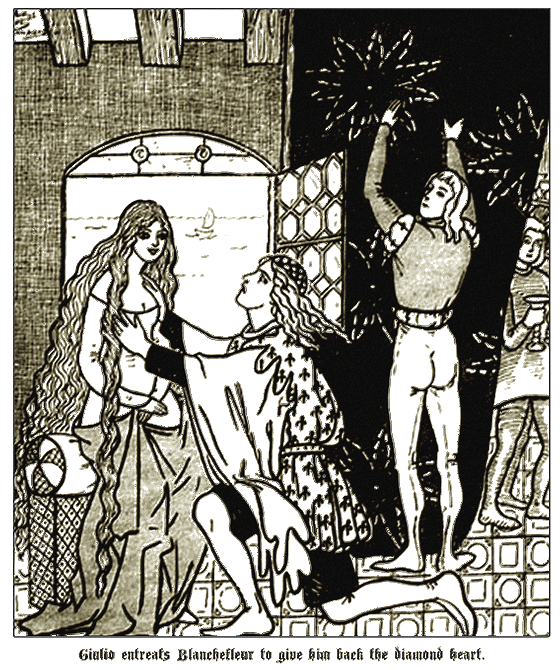
Blanchefleur said nothing; with a smile she took the diamond heart from the long chain by which it hung over her violet gown and gave it him, and he went swiftly out and sold it for five hundred ducats.
With the bag of gold in his hand he went sadly, sadly, humbly, humbly, up the hill to the church, and a great number of people ran after him, out from the city gates, cursing him and hooting him, for he owed more than he could ever pay.
But he hid the gold in his mantle and escaped them, and, pale and breathless, reached the convent and the Prior's room.
The Prior was painting a Book of Flowers; he sat in a black chair at a black table which was covered with the little plants he was copying.
"It is a long time since you have been here, Don Giulio," was his greeting.
The young man bowed his head. "I wish to finish the church," he said, "but this is all the money that I have."
He untied the canvas bag and emptied the gold coins on to the black table among the little plants.
"Alas!" said the Prior, "that is not enough—the marble alone will cost two thousand ducats—and to raise the angel—"
Giulio stayed to hear no more; he knew that nowhere could he get two thousand ducats...with a shriek which made the Prior shiver to his heart he turned and fled.
Only one thing was left to him now, and this was Blanchefleur.
More than ever did he love her in this moment of his utter desolation; she was more to him than a mere woman, however dear—she was the symbol of all his loves and lusts and likings, and of that Deadly Sin for which he stood condemned to hell. She was lost, too, he thought, one with him; and as if with winged feet he ran to her through the hooting town.
She was still in her tower. The creditors were taking the tapestries, the mirrors, the pictures from the walls; all was howling confusion in the palace, the slaves had fled—but she sat still in the seat of the arched window looking out on the garden.
"Blanchefleur!" cried the wretched young man. "Blanchefleur!"
She turned and looked at him and began to laugh; she laughed and laughed—he sprang forward to seize her, and she broke and vanished in his hands; then he knew her for what she was—a doll, a puppet sent by the Evil One to lure him to his ruin.
Then did this most unfortunate young man run out of his ruined palace and aimlessly flee from the town hack towards his church.
For even if it be unfinished, thought he, surely they will give me an asylum where by great prayer and penitence I may save my soul.
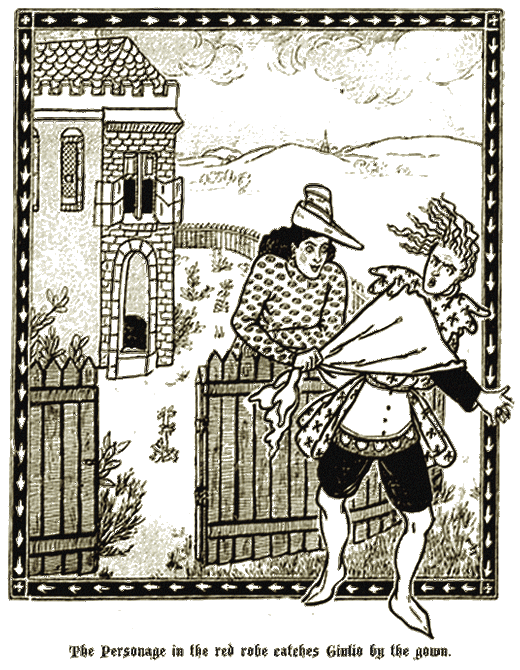
But he had not gone far on the long white road before he turned a corner and saw a sunny house standing in a herb garden. The personage in the dark red robe was leaning over the fence; he smiled and held out his hand and caught Giulio's flying gown, and drew him in through the narrow, open gate.
Nor was he ever seen again on the earth—but long remained an example of the terrible end that comes to those who follow this sin of Luxury.
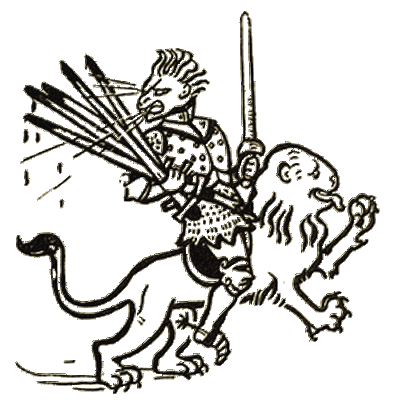
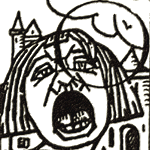 NE November day, when the novices were seated round
the fire in the kitchen roasting chestnuts, a dispute fell out between
two of them on some trifling matter, and Father Aloysius, who had
observed much quarrelling of late among them, took the opportunity to
talk to them of the fourth deadly sin, which is Ira, or, in the vulgar
tongue, Wrath, which is the very sin, together with Pride, that caused
Lucifer to be cast from heaven.
NE November day, when the novices were seated round
the fire in the kitchen roasting chestnuts, a dispute fell out between
two of them on some trifling matter, and Father Aloysius, who had
observed much quarrelling of late among them, took the opportunity to
talk to them of the fourth deadly sin, which is Ira, or, in the vulgar
tongue, Wrath, which is the very sin, together with Pride, that caused
Lucifer to be cast from heaven.
And this story that Father Aloysius told was not one of his own knowledge or his own country, but one that had been imparted to him by a certain Magister, who came from the bitter and barbarous North, and had for a few days been a guest at the convent.
And he, having witnessed divers curious things in his own land, had made a great book of them, together with paintings clone to please his fancy, and the receipts for certain charms and a credible relation of his journeyings in search of the Philosopher's Stone, which, he declared, was in the hands of the Jews.
And several of these tales he had copied out and left with Father Aloysius for his instruction, declaring he knew them to be true, and that they had all happened in his time, and to his knowledge.
So this evening the monk brought down the manuscript of the Magister and read aloud the tale entitled, "A very Faithful Account of Some late Marvellous Happenings in the town of—" (for prudence, the name of the town was omitted, but the Magister had called it Alstein in Franconia). And this was the tale.
In a certain town there was a woman dwelling who was universally held to be a witch.
She came of a great family, and had in her time been dowered with lands and castles, but some mysterious disgrace had fallen on her youth, and she had nothing left but a small farm where she brewed beer and made sausages and kept a few herons, whose feathers she sold in the moulting season, and by these, with the revenue from the beer and the sausages, she made her living, though she used all means to disguise this fact, and pretended that she had wealth from her lands and forests which no longer existed, as all knew well enough; but, as I have said, she was a witch, and who dared offend her? The whole town was in awe of her, from the Sheriff to the humblest peasant, and the tricks she had played on those who offended her were enough to fill a volume by themselves.
Her name was Ottilia Von Angers, and surely never did anyone disgrace a proud old name as she disgraced hers! Woe to the town that sheltered her! (For she was not a native of this place, but came from long off somewhere in Swabia, I think; at least her former history was not clearly known.)
Well, this fine morning in May she jumps out of bed, puts on her worn old velvet kirtle and her old brass chain which she had rubbed up to look like gold, and off she goes to the market to buy the herbs for the beer and the meat for the sausages. To right and left such bowing and salutations and lifting of caps! You would have thought it was a fair young maiden going abroad instead of an old hag with a face yellow as butter looking her full seventy years (though she admitted to scarce fifty).
There she was in the market-place, bargaining and chaffering and shrieking out on the impudent rogues that dared to cheat a high-born lady like her, when she saw a little cart being driven full speed through the buyers and sellers.
There was only one person in it, and she was an old woman wrapped in a black cloak with her grey hair blowing out behind her; every one stared at her, for she was a stranger. And Ottilia was so interested that she stopped bargaining and hobbled after the cart.
When she came up with it, it was stayed outside a stall and the old woman had descended—and what was she buying but two new brooms!
So Ottilia pushes up to her and the following conversation began:
Who was she, what was she doing here, and why was she buying brooms?
Her name was Trina Von Ebers; she was a poor woman, God help her, and she made her living selling cheeses. As for the brooms, she was buying them to sweep out the new house she had taken—servants were such sluts, as the noble lady must know.
These words pleased Ottilia, for she was proud as Diabolus himself, and she answered, yes, indeed, well she knew it, therefore she kept neither man nor maid; and now she remembered she required a broom herself, and these seemed strong and cheap, though God knew how these people cheated and lied.
So they fell bargaining over the brooms and the new-comer said she had come here to live, and to open a dairy for butter and cheeses, and she hoped the noble lady would accept the present of a dish of her best butter (and good it was, she ventured to say) and a fine round cheese.
This immensely flattered Ottilia, who at once asked if her dear friend would come to dine with her. She had just brewed some new beer—as to her name she was Ottilia Von Angers, and a well-dowered maiden.
The other hag accepted, and Ottilia hurried home to prepare the feast.
On the way she met a scullion of the sheriff's household, and, stopping him, she asked him what his master had for dinner.
To which the boy replied—a great game pie, two side-dishes of venison, an almond cream and a cake of cherries.
So home went Ottilia.
Now, though she had told old Trina she kept no servant, it was not true, for she had an old porter whom she nearly worked to death, and when she reached home, him she sent with a message to the Sheriff saying she heard he had a pie, two dishes of venison, an almond cream and a cake of cherries for his dinner, and she begged he would send them to her, together with a cask of white wine, for she desired to feed the poor of her neighbourhood, like the pious woman she was.
And in case he felt disinclined to send, she reminded him of what had befallen him the last time he would not help her charities, viz. his mouth had been twisted up to his ear, and so had remained for a week, which was doubtless God's judgment on him.
Then the hag starts cleaning up the room and laying the table and putting the furniture to the best advantage; then she goes into the bedroom and fetches a small white monkey and she puts on him a pair of green breeches and a blue coat, he crying the while and preferring his nakedness; but my hag boxes his ears and quiets him.
Then back comes the porter with the Sheriff's dinner following him, borne by two cook-boys, for the Sheriff would as soon have faced the whole army of the Margrave as deny anything to Ottilia.
So the table was ready, and the wine broached and the beer poured, and in came the other hag in a great cloak of catskin dyed to look like sable.
And Ottilia's greeting was—where were the cheese and the butter?
Well, could she carry them through the streets and she in her fine clothes? No, indeed, but to-morrow the servant wench should bring them.
This threw a cloud over their meeting, but they sat down to the Sheriff's dinner and began to gossip and chatter and say how wicked the world was, and how birth and blood met with no respect now-a-days, whereas any fat churl with a gold piece in his pocket got more deference than a belted baron.
And the monkey sat on the table eating from Ottilia's plate and snatching the best morsels while she talked.
And Ottilia brought the conversation round to the cheese, and Trina said she would send for it, and, ringing the bell, summons the porter and bids him run down to her house and ask the maid for one of her best cheeses.
Then the fellow answered: no, he would not run on any of her errands, she was not his mistress.
What, did he dare speak to a lady with that rudeness?
Lady! She might well call herself a lady, for no one else ever would. Why, she was no better born than he.
Then the hag started screaming; he had better take care, she knew how to deal with churls like him! She was a high-born maiden and could prove it!
The porter burst out laughing.
Why, she was seventy or more, and as for high-born, that she was not, he could see; and not fit to sit at table with his noble mistress.
At this Trina screams out to Ottilia to chastise her insolent servant; but it chanced that Ottilia had been by no means displeased by the fellow's rudeness: first, because Trina had not brought the present; secondly, because of the show she had made in the dyed catskin; thirdly, because the man had cunningly flattered her in his last speech.
So she said: well, the boor was rude, but it was no fault of hers, and her friend should have left him alone; after all it was her place to send the cheese, as she had promised. At this Trina crosses her thumbs under the table, and, making a grimace at the porter, she hurries away.
Ottilia should have the cheese and might she enjoy it!
So my hags part coldly.
And Ottilia, looking after her guest, sees her dancing and leaping about the entrance and making faces at the porter. So down she comes running with a beer-mug in one hand and the monkey on her shoulder; but when she had reached the gate Trina had gone.
Now that night the porter was taken ill, so that his groans and cries echoed through the street; his head swelled, needles and pins ran out of his mouth, and something seemed to run up and down inside his throat, so that it was very plain that he had a devil.
So they carried him to the church and put him on a litter before the altar, where he lay like a dead man.
And beside him sat Ottilia, sighing and groaning and declaring the fellow was bewitched and she knew who had done it: it was that wicked woman who had lately come into the town to sell cheeses; it would be a charity to all good Christians to burn her and her cheeses too.
After the fellow had lain there all night and never moved, they sent for a holy priest from the neighbouring village who was an adept in such cases.
So he comes with the Sheriff and the Council and the knights and barons of the town and they all gather round the poor porter.
The priest exhorts the devil, who will give no answer; but, the holy man in his agitation making a mistake in his Latin, the devil suddenly speaks, in a heavy bass voice, and corrects him. Thereupon follows this conversation, which one present put down for the benefit of the curious.
Priest: Who was he, and why was he annoying the poor porter?
Diabolus: They knew well enough who he was, and as for why he was there that was no concern of theirs. Let the holy man mend his Latin. Priest: Insolent answers would not help him; depart he must and should.
Diabolus: That was a fine tale. Evidently the holy man was stupid as well as ignorant.
Thereupon the priest recited certain prayers that caused the devil to run in anger about the body of the poor porter till it seemed that the flesh must be torn from the bones.
Priest: Did these prayers annoy him?
Diabolus: Yes, certainly they did.
Priest: Well, would he answer a few questions and then depart?
Diabolus: What questions?
Priest: Where did he come from?
Diabolus: Where the lean priest and the fat Sheriff were going.
Priest: Let him be civil or the prayers would begin. Were there any witches in this town?
Diabolus: Yes, there was one in church now.
Then Ottilia began to weep and cry out how the ugly devil belied even a poor pious woman like herself; but the Sheriff and the knights and barons looked pale.
Priest: Would he tell them the others?
Diabolus: No.
He then proceeded to sing a love-song in Dutch, to the great scandal of Georges Potsdammer, a worthy knight and the only one who understood that language, and on the priest asking him what he sang he answered: a hymn, and began to mock the holy man in a horrid way.
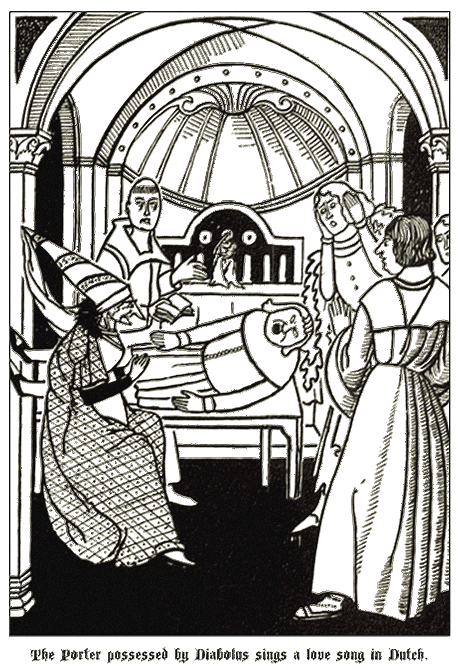
Priest: He had better depart, or they would begin the prayers again.
Diabolus: Well, let them give him something.
Priest: What did he want?
Diabolus: The great fat man with the red nose and the diamond agrafe in his cap.
Priest: That was the Sheriff, and why did he want him?
Diabolus: He annoyed him.
Priest: How could he annoy him? He might have the agrafe of jewels, but not the Sheriff.
Diabolus: Very well, then, they might pray as they liked, they would not move him.
Which proved to be true. For they might pray as much as they liked, they could not pray the devil out of the porter.
So presently up gets Ottilia and away she goes out of the church, so that everyone turns to look at her, she muttering the while that this was a holy man indeed who was not able to pray the devil out of her poor porter; but as for her she had never thought that he could, not he—holy indeed! why, there were those who could tell a different tale!
So off goes my hag straight to where old Trina is busy making cheeses, and in she comes without as much as knocking.
And never a word she says at first, but looks round the room, and, sure enough, there were the two new broom-sticks lying crossed under the table and by the cupboard sits Master Cat looking as demure as you please and daintily licking the drops of grease off the ends of his fur!
Ottilia started shrieking.
She perceived that Trina was a witch and she had sent a devil into her poor porter because the fellow had resented her rudeness yesterday.
Trina: Witch indeed! How dare she say so, and what did she know of it?
Ottilia: What of the broom-sticks and the cat?
Trina: She had bought broom-sticks herself only yesterday, and what of the monkey in his little coloured hose?
Ottilia: Was it not to her credit that she tried to make a Christian of the poor animal? Everyone knew that she was a god-fearing, pious lady. But she had not come here to quarrel; let Trina take the devil out of the porter and give her the cheese and the dish of butter, and they might be good friends again.
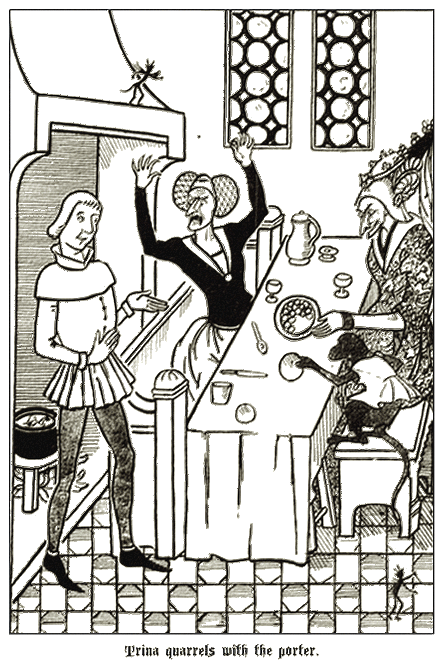
Trina: She wanted no such friends; as for the cheeses, they were seven for a florin, and at that price she might have them.
Ottilia: Seven a florin! She must be mad to speak so to a high-born maiden!
Trina: That was a good joke! Did she think she deceived anyone with her brass chain rubbed up to look like gold, and her old velvet gown turned and scoured a dozen times?
At this Ottilia was so enraged she snatched up the broomsticks from under the table and began beating Trina; then up jumped the black cat and ran between her ankles and tripped her up, and Trina seized the broomsticks and drove her out of doors.
Back Ottilia went, muttering to herself and dancing along the street so that everyone turned aside out of pure fright, and the Sheriff, meeting her as he returned from the church, trembled all over at the sight of her, and begged her to accept a vase of his new honey.
"See that it is good measure," says she, with a leer, and she hobbles back and finds the monkey by the kitchen fire, dipping his hand in the kettle and picking out the best bits of the stew.
At this she, further enraged, falls on him and beats him without mercy.
Ottilia: He was a worthless spirit! Could he not save her porter—could he do nothing but eat and thieve?
Pipkin (which was the name of this creature): That was a powerful spell laid on the porter, but if she would stop beating him he would suggest how she might have her revenge.
Ottilia ceased her blows and they whispered together, and presently they began to laugh and dance, and, my knave from the Sheriff coming with the vase of honey, looked in at the window and seeing, as he declared, three tall shadows leaping up and down on the wall, back he ran, honey and all, and swears he will deliver no more messages there, no, not if the Sheriff was to dip him in the river.
Now Trina gets ready her cheeses and goes to the market with them. Everyone is looking grim, and the bell of the big church is tolling, for the porter is just dead and the devil, in flying out of the corpse, snatched up the altar-cloth and whirled it away through the window, and it may be seen at this moment stuck on the weathercock on the steeple.
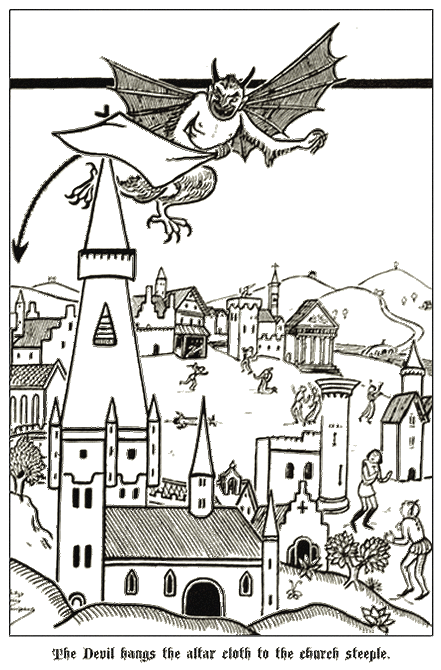
But my hag cheerfully sets out her cheeses, and presently the people gather round, for the cheeses are large, fine and soft, and indeed better than any ever seen in that town before.
And, sure enough, she does a good trade, and it seems as if every cheese on the cart would be sold, when—what happens?
Just as she is taking up the cheeses to hand them to her customers, up they all jump, like live things, and start running down the street.
Everyone stares and shrieks and crosses himself, and off go my cheeses, one after the other—jump, jump, jump!—and after them the hag screaming and cursing.
But she might do as she liked; it was no use, the cheeses hurry along and she cannot keep up with them.
In and out of the long streets they go, out of the gate and past Ottilia's farm.
And there she is at the window laughing and clapping her hands, with the monkey on her shoulder.
Ottilia She was well paid now for bewitching the poor porter! She might run till she burst, she would never get her cheeses again! Ha! ha! How strange she looked, with her skirts all gathered up and her skinny legs looking like two sticks dried in the sun!
But Trina took no notice; she ran after the cheeses. Only what was the use?
They made straight for the river-bank, and there they jumped into the water, one after the other—plump! plump! plump!
And that was the end of the cheeses.
Now Ottilia and Pipkin had a feast, and because the Sheriff had not sent the honey as he had promised, they put a spell on him and turned all the beer in his cellar sour, and all the fish and meat in his pantry bad, so that the smell turned the Sheriff's stomach.
So he in a fright sent another knave with a venison and a salmon and a great pot of honey; and what a feast my hag made! All the afternoon she was frying collops and sausages and making soup and boiling salmon.
Now, there were some friends of hers living near, hags like herself, but afraid of her, and to these she sent a message asking them to supper—for when she had good food she liked to make a show of it, so as to set all talking of her luxury and magnificence.
In came the hags dressed like so many young beauties, and down they sat to the feast, flattering and praising Ottilia and smirking and smiling at each other as if they were the sweetest-tempered creatures in the world.
Well, just as my witch had brought in the salmon and set it on the table and all the guests were ready to plunge in their knives and forks, down comes the ceiling, spoils the feast, and nearly kills them all!
The table was broken beneath the wooden beams, the venison, the sausages, the salmon, the beer, the wine, the honey, were scattered right and left, so that there was not one crumb fit to eat.
Now the old women thought that this was some trick on the part of Ottilia (for she had served them not a few in the past), and as soon as they could escape from the ruins of the table they rose up and went for her, beating her black and blue and swinging Pipkin round by his tail and dashing his head against the wall, she crying out the while that she was innocent and would she have spoilt her own good dinner herself?
They never heeded a word, but beat her till they were tired; then they blew out in a cloud, scolding and quarrelling among themselves.
When they had gone, Ottilia, as soon as she could recover herself, beat Pipkin a little more for not having been able to prevent the falling in of the roof, then put on her best gown and the famous brass chain and went off to find a man to put the roof on again, then, as quick as she could, hobble, hobble, to the Sheriff's.
Shivering and trembling, he bids her come in, though he is in full council discussing no less an important thing than putting a penny a quart on the price of beer.
In comes Ottilia demurely, and, sighing and weeping, she starts her story.
Ottilia: With the venison and salmon his lordship had been so good as to send she had made a little feast for some poor women of her acquaintance, and they, after thanking Heaven for its mercies, were just sitting to table when down came the roof and spoilt everything. This, like the death of the poor porter, was plainly witchcraft, and she accused the strange Trina Von Ebers, and called on the Sheriff to obtain justice for her and damages from that accursed witch. To wit; item, for the value of the porter, 50 florins; item, for the cost of a new roof, 10 florins; item, for the cost of the dinner 5 florins; item, for a new gown totally spoilt by some soup falling over it, 10 florins; and for another feast to compensate her friends for their disappointment, 15 florins.
The Sheriff did not know what to answer; he was as white as the wall behind him. He bit his thumb and looked at the councillors, and the councillors looked at him, and they all coughed and scratched their heads, and did not know what to answer.
Then Ottilia began to frown and scream: What, were they not there to see justice done on a high-born maiden in distress?
And the Sheriff hastily replied, yea, they were there to see justice done, but could she prove the witchcraft? Might it not have been an accident? And, as to the damages she claimed, they did not think this stranger woman could disburse them.
So spoke the Sheriff out of fear of both witches, but Ottilia became more wrathful than ever. Let them search the stranger's house and see if they did not find money enough to satisfy her claims! And, if they found nothing, let them take her out and burn her for the witch she undoubtedly was!
At these words in walks old Trina leaning on a crutch, and goes stumping straight up to the Sheriff and tells her tale of the bewitched cheeses and demands that Ottilia be sent to the rack until she confess it was her doing.
Then the Sheriff and the councillors wished that they had never been born, for, whichever hag they decided for, the other would destroy them with her spells, and the Sheriff saw no escape for it but to die miserably, as the poor porter had died. So he sat there, trembling and biting his thumb, while my witches glare at each other awaiting his answer.
Then presently he thinks of a solution, and declares them both pious women and innocent of all witchcraft, and suggests that perchance there is some evil person in the town who has played these ugly tricks, or else that they were no tricks at all, but mere accidents.
Accidents! screams Ottilia, when he himself had heard the devil speak from the mouth of her porter!
Accidents! cries Trina, when the cheeses had risen up like Christians and run down the street—hop; hop; hop; and the whole town had seen them!
So the Sheriff sighs and says, well, no doubt there was witchcraft in it, and he can propose nothing but a witch-hunt, and pray Heaven they may find the evil-doer.
Now, this is not at all to the liking of my hags, and they stretch out their lean throats and scream out a protest, each shrieking that the other is the witch and no need to search further.
But the councillors are pleased with the Sheriff's plan, for, think they, the excitement of a witch-hunt will help to reconcile the people to the rise in the price of beer.
So off they hurry and find swords and sticks and bunches of hazel tied with scarlet thread and make a proclamation of a witch-hunt, to which all the town folk respond, well pleased.
And the two hags see nothing for it but to join in the chase, the one with her monkey, the other with her cat, though their wrath against each other was by no means abated, and both yet hoped to serve the other some shrewd trick or turn that would send her to the stake.
Now, while this chase was taking place through the streets, the altar-cloth that had been fluttering from the weathercock of the steeple where it had been blown by the devil to the great scandal of all good Christians, suddenly fluttered down, though there was no wind, and fell on the roof of a house in the High Street, which the crowd at this minute were passing.
And the woman who lived there came running out, shouting:
Had any one heard the like? All the apple-trees in her garden had become suddenly covered with fruit, and this but the middle of May!
Now, this greatly pleased my knaves, who thought that they had found magic at last; so they bundled the woman back into the house and rushed into the garden, and there, sure enough, were three little apple-trees, covered with red and glossy fruit; but when one struck his teeth into them he found his mouth full of ashes.
So here they had it at last, and some were for taking the woman and burning her at once, but there were two objections; item, she had a very good character, and earned her living by knitting gloves for the priests; item, there was no one among them who knew how to burn a witch, and the fellow they had sent for had not yet arrived.
In the midst of all the delay and confusion and bawling and fighting, two of the knaves start searching through the house for broom-sticks, cauldrons, or any signs or mark of the Evil One.
And what do they find?
A fair lame maiden, seated on the floor in one of the dusty garrets.
And she could give no account of herself; so they dragged her down before the Sheriff, and the housewife declared that she had never seen her before, and that it was she, sure enough, who had bewitched the apple-trees.
And my hags join in out of jealousy, seeing the girl is young and comely, albeit lame, and swear this is the witch and no other, and now they can have their witch-burning.
So off they all go—hurry, hurry, hurry—to the market-place, and, the witch-burner having arrived, the stake is prepared, and a fine bundle of green wood brought, and everyone pleased and content at the thought of the holy and pleasant spectacle, when what must Ottilia and Trina do but start anew to quarrel, each telling the other she should join the poor maiden at the stake.
And Pipkin and the cat begin fighting until it is an awful sight; for as they fight they grow larger until the monkey is the size of a soldier, and the cat the size of a bear.
Then, while every one is shivering and trembling, and not knowing what to do, there comes a clap of thunder, and who should step into the market-square but the Devil himself?
Now, fiends, imps, evil spirits, familiars, ghosts and witches were well known to the good citizens, but the Devil himself was quite another matter, and they all began to roar with fright.
To begin with, he was as tall as the cathedral, he had a tail that lashed over the house-tops, and his long hair shook in the sky like banners. So he puts one hoof in the market-place and glances down with his red eyes, then he takes up the two witches as a man might take up two hens and tucks them one under each arm, and off he goes over the houses—stride, stride, stride—and disappears with another clap of thunder.
And that was the end of my hags.
Now when the crowd had recovered its senses, the cat and the monkey had disappeared, and there was the poor maiden weeping at the stake. So they gave her her liberty; it seemed she was a poor orphan hired to do a day's spinning, and her mistress had denied her for fear. She afterwards married George Potsdammer; so this was a lucky day for her after all.
Now, everyone was satisfied, save the witch-burner, who said: how was he to be paid?
But the Sheriff was so pleased to be rid of Ottilia that he paid the fellow the same, and so all went to a feast in the town-hall.
Alas, they might well feast! Soon it appeared that the devil had let Ottilia loose again, and back she came in a new fur tippet; but that is not in this tale.
Here ends the story of the Magister, and the next pages of this manuscript deal with a plan for conversion of the Jews and an account of Benedict D'Arles, who spent thirty years trying to produce the Philosopher's Stone from decayed hen's-eggs, mercury and seaweed, and died mad.
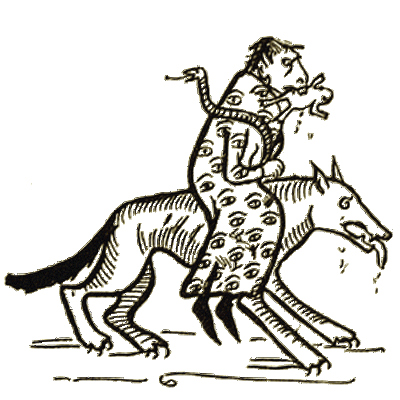
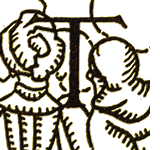 HE winter sun, pale and clear as thrice-refined
gold, warmed the rich countryside which lay beneath the Convent; the
pine trees with fox-red cones, the thick olive trees with the clustering
grey fruit, the chest nuts heavy with tawny foliage, covered the
hill-slopes to where they joined the valleys, divided by silver-stemmed
larches and slender poplars, bearing a few last leaves, flat and bright
as a gipsy's sequins, into fields where men, women and oxen worked,
turning over the fresh brown earth.
HE winter sun, pale and clear as thrice-refined
gold, warmed the rich countryside which lay beneath the Convent; the
pine trees with fox-red cones, the thick olive trees with the clustering
grey fruit, the chest nuts heavy with tawny foliage, covered the
hill-slopes to where they joined the valleys, divided by silver-stemmed
larches and slender poplars, bearing a few last leaves, flat and bright
as a gipsy's sequins, into fields where men, women and oxen worked,
turning over the fresh brown earth.
On the roofs of the farmhouses figs were drying in flat baskets; from the doors and windows hung the red gold strings of maize; and in the gardens, by the stone wells or the marble shrines of the Madonna set in the wall, the orange trees showed the dark glossy foliage and the brilliant fruit.
The wine harvest was over; in the stone courtyards sat girls and children rapidly fashioning covers for the flasks from the dried stems and leaves of the maize; the laurels were covered with berries, scarlet, purple and green; and here and there in some sheltered garden a white or crimson rose blossomed on the same stem as the vivid yellow fruit.
Through this winter landscape rode a young lord with a sin on his soul; he rode to the Convent. In his furred habit, with tassels of scarlet, he went humbly through the cloisters where the slanting sunlight lay, and confessed to Father Aloysius. And though the good monk absolved him, he was still uneasy, for his sin was a grievous one.
"How can it be?" he cried, "that I shall be forgiven?"
Then Father Aloysius took him by the hand and led him into the garden.
It was very still; above the low line of the cloisters tine insects crossed each other in the blue sky; there was just breeze enough to rustle the shining leaves of the lemon trees that drooped heavy fruit against the wall.
"There is no sin," said the monk, "too heinous to be forgiven, if one truly repents. As witness the tale of the hangman of Pisa, which is out of the book called The Rosarie of Our Lady, wherein are other examples, there being one for each bead on the rosary.
"Now this hangman was a wicked and bitter man, who had never done a good action in his life, but had taken up his awful trade for pleasure in it and would go to a hanging as merrily as a maid to a dancing. There was no one who loved him or respected him or pitied him; never was he seen in a church, nor any holy place, and when some poor wretch, about to die under his hand, would murmur a prayer for God's pity, my hangman would laugh and scoff in a way horrid to hear.
"It happened one day that he was going forth to hang an offender; he was clothed in the garments of the men he had executed, and he carried a rope in his hand, for there was need of a new one for the gallows.
"It was a sweet and lovely day in spring, the flowers were blowing in the gardens and on the hillsides, and many people were singing because of the pleasant season of the year.
"The hangman felt suddenly uneasy: for the first time in his wicked life he noticed how the children and the young maidens ran away when they saw him coming, how the men crossed to the other footway, so that his path was always lonely.
"And for the first time since he had begun his present horrid occupation, he thought of the poor prisoner whom he was going to hang.
"When he came to Pisa bridge, where is the shrine of the Virgin set into the wall, a child running from him dropped a cluster of wood-violets. And the hangman, on the impulse, picked up the flowers and placed them on the little shelf before the Virgin, and at the same time commended his soul to Our Lady.
"Then he went on his way again, hurt, passing through a narrow street, he was intercepted by some relations of the man he was going to hang, and they slew him.
"Now there was then in Pisa a certain priest who nightly walked about every church in the city, and that night he rose up and went to the church of Our Lady.
"And as he passed through the churchyard, he saw a great many dead men gathered together in a company.
"Some of these dead men he knew, and of them he asked what was the matter.
"And one of them answered, 'The hangman is slain, and the Devil challenges his soul from Our Lady, who says it is hers; and the Judge is even at hand coming hither to hear the cause, and therefore,' said they 'we are now come together.'
"Then the priest thought that he also would be at this hearing, and so hid himself behind a thorn tree, and anon saw the judicial seat prepared and furnished, whereon the judge, to wit, St. Michael, sat, and near him was Our Lady.
"Soon after, the devils brought in the soul of the hangman pinioned, and they proved by good evidence that he belonged to them.
"On the other hand, Our Lady pleaded for this poor wretch, contending that he at the hour of death commended his soul to her, and laid a bunch of violets before her shrine on Pisa bridge.
"St. Michael, hearing the matter so well debated on either side, willing to obey Our Lady's desire, and yet loath to do the devils any wrong, gave sentence that the hangman's soul should return to his body, and by his future conduct should his fate be decided; he further ordered that the Pope should set forth a public form of prayer for the hangman's soul.
"Thereupon the devils demanded who should do this errand to His Holiness?
"'Why,' said Our Lady, 'yonder priest who lurketh behind the thorn tree.'
"So the priest was called forth, and the message given him, which he did accept, saying however, 'By what token shall I persuade His Holiness?'
"Then Our Lady took a rose from her girdle and delivered it him, saying, 'This shall be the token whereby ye may desire the Pope to take the pains to do as has been decreed.'
"So the soul of the hangman returned to his body, and the priest went to Rome, and when the Pope saw the freshnessd freshness of the rose after it had been three days in the priest's wallet, he knew that the story was true, and he ordered prayers to be sent up for the recovered hangman.
"And the hangman so lived in holiness that when he died those about him very plainly heard the opening of heaven's door to admit his soul.
"By which you see," added Father Aloysius, "that one simple prayer and a handful of flowers were sufficient to save the soul of a wicked man."
At which the young lord rejoiced, and went away comforted.
But a certain voting novice, seeing him depart in his finery, envied him, saying, "Look at his furred boots and his tassels, and the hat with the heron's feather, and the chain and the beryl stone!"
Father Aloysius heard him and rebuked him:
"That man whom you envy," said he, "is fallen so low that he considered himself lost until I comforted him with the tale of the great mercy vouchsafed to the hangman of Pisa.
"He takes no pleasure in his hat or his feather, in his furred boots, nor in his chain with the beryl stone: therefore be not envious of this splendour of his. And I would further remind you that Envy or Invidia is the fifth of the Deadly Sins."
Now several of the novices who were about under the lemon trees, picking the fruit and piling it into deep wand baskets, began to dispute and complain about the dictum.
For envy (said they) could by no means be called a deadly sin, only a venial one, for what harm could come of it to anyone—either to the object envied or to the person who envied?
Neither could this sin be considered the beginning of other sins, or the root of evil, as were Pride, Greed, Wrath.
Besides, it was a failing common to all, and by no means to be subdued save by a saint or hermit, and even these had been known to envy the angels in heaven.
Thereupon Father Aloysius seated himself on the edge of the well, where he had the sun, and expounded the fifth deadly sin, which some, he said, put second, as next to Pride and before Greed and Wrath.
And after this manner he expounded:
St. Augustine saith, "Envy is sorrow of other men's weal, and joy of other men's woe;" and that is a true definition.
It is a very horrible sin (said the Father), inasmuch as it goes secretly and is very often undiscovered, so escaping among the ignorant, such as ye, as a venial fault hardly to be noticed, when instead it is the generator of more evil in the world than three of the other sins put together.
And I tell ye this, though there may be many a good or brave man, tinct in some way with the other sins, yet there was never one that had a spark of virtue in him who was a prey to envy; for it is properly a sin of mean, small, creeping souls who lack the courage for lustier vice.
Envy is one and the same with Malice, which it is sometimes called it is against all virtue and all goodness, and it is like the Devil, inasmuch as it rejoices at the harm which befalls mankind. It is the parent of backbiting, detraction, slander, false witness, scandal, unkindness and cruelty.
So great a sin is it that it is mentioned in the Ten Commandments, which say nothing of Pride, nor Greed, nor Avarice.
It goes against God when it complains of God's orderings, as, the pains of hell, or poverty, or loss of cattle, or rain, or tempest, all of which ills man should suffer patiently, for they come from God's own hand.
And Envy is cowardly, and dare not openly show its face, but murmurs and grumbles and complains and detracts privately; and these secret mutterings of Envy are termed the Devil's Pater Noster, though the Devil never had a Pater Noster, but lewd folk so call this sour whispering of Envy.
And from Envy come rancour, and grudging, and bitterness of heart, and discord, and false witness, and malignity.
And it is the most difficult sin of all to fight, for it goes generally cloaked in the semblance of some virtue.
And there is this tale to be told of Envy, though there are many others more pointed and dreadful; but this I know to be true:
It happened in a far country, where there is much snow and little sun, many clouds and few flowers.
There the hills are so high that one may walk all day through the valleys, and never see the sun, though it be never so brightly shining. There are great waterfalls and ravines and lonely stretches of rock; and the land is mostly barren, for they find there neither gold nor silver mines, nor marble quarries nor any natural riches; nor does any fruit flourish nor any grain save that little they painfully grow on the shelves of rocks. But in the lakes and bays are plenty of fish, and there are vast forests of pine, of which they sell the wood.
In this country is a castle, the most considerable they have, close to their largest town. They call it the Blue Tower because it is built of wood and painted blue; they use neither brick nor marble in their building, but of wood they can make anything, a delicate toy for a child or a ship that will sail over the world's seas.
They are a rude people, strong and fair, and still barbarous in their ways; they have no arts save those of embroidery and carving, and their sole poetry is a number of wild, fierce songs they sing in the evenings round the fire; it is said that many of them are not even Christians, but still devoted to heathen idols.
However this may be, they are cruel and brave in war, and dart out on their icy seas in their dragon-prowed galleys and seize any luckless ship that may be in their waters.
And there is the excuse to be made for their godless conduct that they have a hard and bitter life in their cold and barren land.
In this Blue Tower lived a certain nobleman with his daughter. They were very rich for that country, and would drive to and fro the town in a sledge with scarlet cushions and silver bells, drawn by four reindeer, with little gold tips to their horns; and there was always plenty of meat on their table, even in the scarce seasons, and plenty of mead in their horn goblets, a great fire burning always on their hearth, hangings of gaily worked woollens and coloured lamps in their chambers, and on the lady's arms bracelets of rough gold, and in her ears pendants of turquoise.
They were, besides, much loved by their people, for they were open-handed and gay, and brave and just and kindly.
Among their peasants was one named Frithiof, who was good and intelligent, and clever indeed at the wood-carving in which these people excelled; he could take a little bit of rough wood and turn it into the likeness of a flower, or a face, or a bird, or a toad, or a witch, or a fairy, while he drove the reindeer to their stables.
And his master encouraged him, buying his work and praising it, and at last ordered him to carve him a chair to sit in on feast-days, a chair deep and high, with the old heroes they sang of after supper carved on the back, an inch deep in the good thick wood.
Now when Frithiof heard this it was to him as if all the little silver sledge-bells were ringing in his heart, for he was in love with a maiden named Rieke, and she loved him, and the price of the chair would he sufficient wherewith to build a house and buy a piece of ground, and perhaps even a reindeer, and so they could be married before the winter was over.
His lord knew of this ambition of his, and favoured it, and showed him the piece of land waiting for him, and his daughter declared she would give the bride a square of scarlet cloth for a wedding present; and Frithiof heard the silver bells ring louder in his heart, and saw the cold northern sky rosy with hope.
Now Rieke was a very lovely maiden, with thick pale yellow hair, which hung to her knees, and blue eves like the little flowers which grow up in the snow-hills, and are put there by the angels to remind men of God in desolate places.
She was pious, too, and industrious; she could comb and card wool, spin and dye cloth, fashion garments and embroider them, milk the reindeer and harness them, make caps and purses and gloves and bags out of fur.
But withal she was of a discontented and jealous mind, and though she truly loved Frithiof, she never saw him in his good rough garments but she was shamed in her heart and wished that she had a finer lover.
And when he came and told her of his good fortune with the chair he was to carve for his lord, she was not so pleased as he had thought she would he, and she sighed to herself, saying, "This is not a grand future: a few yards of ground and a hut." And in secret she filled her heart with all the old legends and tales in which maidens had come to marry great knights by reason of their fair faces.
So the winter came, and the world was white and silent with snow; it lay on the ground, on the boughs of the fir trees, on the mountains and on the ice that covered the lakes and bays, on the roof of the Blue Tower, and on the roofs of all the little huts beneath.
And as Rieke sat at her door, spinning, wearing a red gown and a blue apron and cross cloths of yellow and red on her head, she saw the lord's daughter driving in her sledge through the forest.
She was going to some feast, for it neared Christmastide, and she wore, plainly visible beneath her fur mantle, a white vesture.
Now she, being a gracious lady and seeing Rieke working at her door, stopped her sledge and entered the hut and spoke kindly to the girl about the wedding drawing so near.
And as she stood talking in the warm room, she put back her mantle, and Rieke saw the white gown, pure as the snow, with white fur on the bodice, buckled with rough pearls; and she heeded nothing of what the lady said, but thought only of the white gown; and when she had gone, tinkle, tinkle with her reindeer over the snow, Rieke sat down and wept.
"I should look fairer than she in a white robe," she thought, "for I have yellow hair and hers is dark—but no one will ever give me such a gown."
So she lamented until the devils of discontent and envy and malice and jealousy got hold of her, and when Frithiof came to her that evening, flushed and happy from his work, she received him sullenly.
As he sat by the fire and her old mother told them fairy tales, he carved her a necklet of the blue mountain flowers, so delicately done that at a breath they trembled like living petals.
But Rieke put it about her white neck sadly, and thought of the fine chains the lord's daughter had worn, of pure gold, seven times round her throat, and then hanging to her knees.
And as the days went on she became more and more gloomy and distracted, and took no pleasure in Frithiof's eager talk of the home they would have, nor her mother's gossip of the wedding feast, of the mead the good lord would send, and the piece of scarlet cloth that was to be the gift from his daughter; for every day she longed more and more for the white gown, and when they spoke of the dancing there would be, she looked at her rough shoes and thought, "How can I dance in these?"
Now there was a certain neighbour of hers, named Helva, who owned a pair of shoes made of soft skin and laced with silk, and on Rieke once telling her how she envied them she pleasantly promised to lend them for the wedding.
"But what is the use," thought Rieke, "of fine shoes, if I have to go in a coarse coloured gown?"
And she became so pale and ill and sad that Frithiof, full as he was of his own joy, could not fail to notice it, and often demanded of her what the grief was; but she put him off, since she was ashamed to tell.
But one evening he came to her, happy and singing, with the price of the chair in his pocket, and she could bear it no more, but broke into tears and told him how she longed for a white gown.
And Frithiof went out into the snow and looked up at the stars above the pine trees and tried to understand.
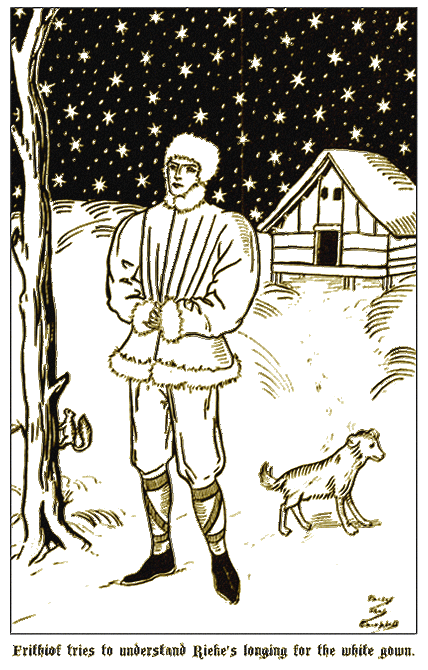
He loved her, therefore he could give her no blame; he only realised that he had gold in his pocket, and that she was weeping for a white gown. So he sighed, and sighed, and presently went to a neighbour and borrowed his sledge and drove to the town.
And there he went to a merchant's and bought a white gown with fur and rough pearl buckles, and the price of it was the gold he had got foci the chair, and his savings besides, so that all the long labour of days and nights and months and years went in this flimsy piece of finery.
But Frithiof did not care; they could wait for the wedding and the house as long as he could make her gay and joyous with his gift.
And gay and joyous she was when he brought it to her; she kissed him, she danced and sang, and cared nothing when he told her their wedding must be postponed, for he must go back to his work again to earn the money for the house and the piece of land and the reindeer.
So he went away and took a great block of wood and began hopefully to carve a dragon for the prow of a ship, the which he hoped to sell to the shipbuilders who were getting ready new ships for the spring.
But Rieke thought of nothing save the white gown. She did not like to show it to her mother, because she had a kind of shame in the possession of anything so costly; but late one afternoon, just before it came to the time of candle-lighting, she crept up to her room, slipped out of her red and blue clothes, and put on the white gown.
Alas, there was no mirror on the rough pine walls, so Rieke could not admire herself; but she combed out her long yellow hair and shook it over her shoulder, and fingered the texture of the gown and admired the way the silver border rippled over the floor.
But her coarse shoes spoilt all, and she thought that she would go to Helva and borrow the fine slippers, at the same time making a show of the white gown before her friend, to whom she wanted to say, "See what a fine lover I have! He went into the town and bought me this gown!"
So she stole softly downstairs and out into the snow. It was very cold, and heavy grey clouds were coming up over the hills, but Rieke thought she could get to Helva's and back before the storm came, and she put on no cloak, for she had none worthy of such a gown.
Hurrying she went over the snow. It was beginning to get dark, shadows lay blue beneath the pines, and the girl's breath showed frozen before her; shivering with cold and panting with running she came to Helva's cottage.
Impatiently she knocked at the door, crying, "Come, Helva, and see my new gown!"
But there was no answer, nor any light coming from the window.
"Come quick," cried Rieke, "for the storm is hastening over the trees. It is getting dark, and I have no mantle!"
Then, as there was still no answer, she raised the latch and entered.
And she beheld Helva's mother and little sister weeping, and they took no notice at all of her attire.
"Helva is dead," they said, and Rieke bowed her head and wept with them.
Yet she could not help secretly wondering what had become of the fine silk-sewn slippers.
And presently she went into the bedchamber to say farewell to her friend.
And there lay Helva, smiling, on the clean sheets, and on her feet were the shoes.
Now Rieke began to envy the dead.
"What are the shoes to her?" she thought. "She does not need them in her grave; if she had been alive she would have given then to me, and it is foolish for these shoes to be lost in the corruption of the earth when I need them."
And so, from envy and jealousy of the dead, she came to a more dreadful thing.
She slipped the shoes off Helva's feet and hid them in her bosom, and ran out of the cottage.
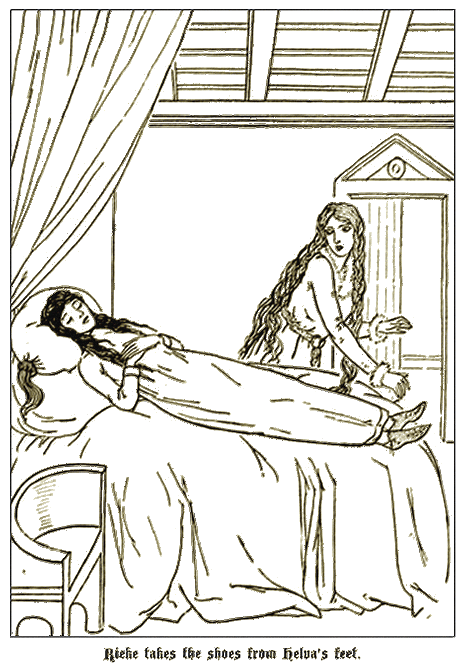
The sky was now dark and the twilight fast descending, but at the edge of the wood Rieke stopped and took off her shoes and put on the fine slippers, already cold from the cold flesh of the dead; and as she put them on she shivered to her heart.
And she began to be afraid.
"Just for to-night," she said; "to-morrow I will give them back."
Now she was dressed like the lord's daughter, but she was cold—ah, cold!
She wrapped her hair round her shoulders to keep herself warm, and she tried to hurry, but her limbs were too stiff to move swiftly, and the storm came up, and the snow began to fall in great flakes, softly, softly, softly.
When she reached home she saw the cottage lights fall cheerfully across the night; eagerly she knocked and cried to them to admit her, quick, quick! But her mother looked from the window, and seeing the white figure crouching outside she said, "This is not my daughter Rieke, this is a ghost or witch. My daughter Rieke is up at the Blue Tower helping the maids card wool;" and she closed the shutters and bolted the door.
And Rieke cried and lamented outside in the falling snow, and darkness, and the keen wind which shook the pines.
And when she saw that her mother would not open she turned away to Frithiof's cottage, and rapped with her frozen knuckles on the lattice. Frithiof was seated gazing into the red roses of the fire, and dreaming of the days when Rieke would sit beside him during the long winter evenings.
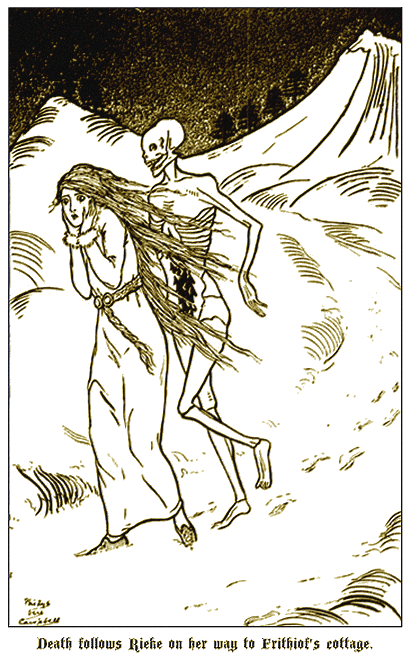
Then, while he carved, she would spin, and they would tell each other tales of the long ago, of dragons, salamanders, elves, witches and fairies, and great heroes in gold armour.
And he counted up once more on his fingers how long it would take him to earn enough for their wedding, and while he counted he heard the tap, tap, tap at the window, and presently a voice crying, "Let me in, let me in!"
So he hurried to open the door and look out into the night, and out of the snowstorm came Rieke, chilling the room with her cold presence.
And she was all white, save for the long strands of her wet yellow hair.
And Frithiof brought her to the fire, and besought her to speak to him; but she could say never a word more, for she was frozen to the heart.
Wet and chilly was the white gown, wet and chill the thin shoes; the bitter snowflakes melted on her cheeks and clung like a wreath about her hair; and though Frithiof kissed her and put his warm cheeks next hers, he could bring no life into her; and though he brought hot mead, he could not force it between her blue lips.
So he wrapped her up in his fur coat, and set her before the fire, and ran out to fetch her mother and the neighbours.
But what was the use of their hurrying with their possets and their blankets?
Rieke was dead in her garments of ice, dead and cold, cold as the flying snow outside.
And they found that her feet were bare, so believed she had lost her shoes; and when they came to put Helva in her grave they found the fine slippers on her feet as if they had never been disturbed, which is a matter the good angels know of, surely.
So Frithiof never carved the dragon prow for the shipbuilders; of the wood he made a coffin for Rieke, and she was laid in it in the white gown, and on the day before Christmas buried in the little church on the hill-side.
And Frithiof went away from there, no one knowing what he did with his days, though it is believed he wandered much and died a monk in Syria.
But the chair with the price of which he bought the white gown may still be seen in the great hall of the Blue Tower, and though it is a little eaten by the worms and the rats, you may still discern the old heroes carved in the good black wood.
Now I might tell you many more stories of Envy—as that of the man who envied his neighbour who had the ceiling of his dining-hall covered with gold pieces, and at last did his own in like fashion; but as he was not rich, he used gilded lead, and one day as he was carving the meat, down fell a false piece of eight and killed him; or the lady who envied her brother's wife for her small waist, and drew in her own so tightly that she died; or the man who out of malice bore witness to a forgotten crime of his neighbour's, and so discovered one of his own for which he ended his life in prison; or the thieves who envied each other's share of the booty and quarrelled so loud they were all apprehended and justly hanged; or the maid who swore evil things of another, and was ducked as a witch for coming by such secret knowledge of another's sins, which she could only have discovered (they said) by the aid of the Devil; or the monk who envied the abbot and spoke maliciously of him, and that day (being Friday) was choked with a fish-bone; or the woman who envied the statue of Our Lady for her jewelled crown, at which the lamp before the shrine went out, and in the dark the woman fell and broke her neck. But I have spoken enough of Envy and all the evil consequences thereof, which I pray you heartily beware.
So the novices took up their baskets of lemons and carried them into the Convent.
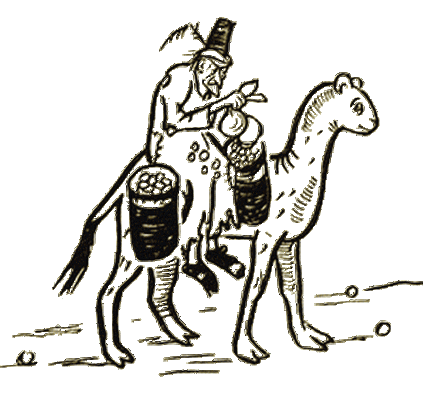
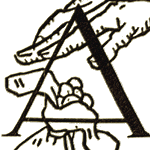 CERTAIN Cardinal came to stay at the Convent, and
was entertained in a royal manner, as befitted his rank; three weeks he
lingered, putting the Convent to great expense, and when he left he gave
them no more than his blessing, though they had expected at least a
relic for the Chapel and a pound of gold for themselves.
CERTAIN Cardinal came to stay at the Convent, and
was entertained in a royal manner, as befitted his rank; three weeks he
lingered, putting the Convent to great expense, and when he left he gave
them no more than his blessing, though they had expected at least a
relic for the Chapel and a pound of gold for themselves.
And this led Father Aloysius, who was sorely angered, to speak of the sixth deadly sin, which is Avarice, or, in the classical tongue, Auaricia, with which is included another sin, that of Coveitise, of which Saint Paul saith: "The root of all harm is Coveitise."
Which sin is different from Avarice in this, that Coveitise is the unlawful longing for what one has not, and Avarice is the longing to keep what one has without lawful need and excuse.
And there is an Avarice of glory and science, as well as an Avarice of cattle and treasure; an Avarice of things of the soul, as well as of things of the body.
And he who is avaricious breaks the first commandment, which is against false gods—as he who follows this sin makes many false gods and worships them all, and never chances to lift his eyes to where the only and one God sits enthroned; nay, he is absorbed in his worldly good, and thinks of naught else until the day the devil catches him by the neck, saving: "Ho, come you with me!"
Neither shall it save him (said Father Aloysius) if he wear a Cardinal's hat!
And further to impress over and above all these gathering complaints (for
all from the Abbot to the scullions were murmuring against their visitor) the
hideousness and evil consequence of this sin, he brought out the book of the
German Magister, and read them this story:
Further back in this book of mine I spoke of a certain notorious witch named Ottilia,* who was carried off bodily by the devil, and afterwards returned, wearing a new fur tippet, to the great dismay of the townsfolk.
[* See " Wrath," Chapter 4 in this ebook.]
But who dare say anything?
She had a very plausible story to tell; she said she had been visiting an ancient aunt of hers, in a distant part of the country, who had died recently, and who had left her (honest woman that she was!) two cats, a bag of gold, and the fur tippet.
As for that scene in the market square, when one ventured to speak of it, she treated it all as a jest—that was a fine tale indeed; it was quite clear that there were a good many people with an evil conscience, when they imagined they saw things like that!
So she went back to her beer-brewing and her sausage-making; she had a new roof put on her house, and she bought some new furniture and a blue velvet gown, and no one dared say aught, though they all groaned and sighed at having her amongst them again.
As for the cats, they were not like ordinary beasts, but had large round heads and small bodies, and wore sad, dun-coloured coats. One was called Guzzling Grizel, and the other Wait-on-yourself; for the first was never happy save when eating, and the second when asked a favour, however trifling, would always reply 'Wait on yourself.'
Now it was perfectly well known that these cats were nothing better than imps who had taken the place of my Pipkin, who was never seen again. Nor was Trina, the other witch, ever seen again—and none dared ask after her.
So Ottilia lived quietly for a while, making her beer and her sausages, and going to the market and selling them, sometimes buying a broom and sometimes a bit of finery for herself or her imps.
And one clay she was sitting by the fire after dinner when there came a knock on the door.
So up she hobbled, ready with a sour word if it should he one of my hags come to visit her; she sees instead a handsome young man, very mournful and sad, so she begins smiling and saying all the servants were abroad, and the porter asleep, as she also would have been had she not stayed up to say her prayers. But will he step inside and state his business?
My young man listens to all these lies very courteously, and asks if she be the Lady Ottilia?
"Yes," says she, highly flattered; "come in, fair sir, and taste my beer, which is better than any brewed around."
So he entered and sat by the fire and sighed and groaned.
She: What was the matter with him that he seemed so downcast? Let him taste her beer!
He: He had not come for her beer, but for her advice; for he was quite in despair, and he had heard she was very wise.
She: She believed she had as much sense as her neighbours!
He: Well, he was in trouble; let her help him, and she should not back for her reward.
She: She was willing to do her best as long as it was not some silly love affair, for with such things she had no patience!
He: No, he had never been in love in his life, nor ever seen a woman so pleasing to him as she was now, when she promised to do her best for him!
At which Ottilia was mightily pleased, and told him he must not think of trying to get round her with compliments, for she was not a foolish girl, but a woman turned thirty, though she had heard said she looked younger.
"Not a day more than twenty-five," said he; at which Guzzling Grizel and Wait-on-yourself burst into laughter, and Ottilia kicked them out of the room.
They: She had some vigour in her still, though she was seventy-seven yesterday!
At this Ottilia hoped he would excuse the poor beasts, who were little better than heathen still, for all the trouble she took with them.
He: What did it matter? He was not such a good Christian himself. If she would hear his trouble, it was this:
He was a master mariner, and had made many sailing; in many parts of the world, and seen many strange lands.
And ever since he was a little child one thought had tormented him—why did the ships turn hack? Why not sail on and see if there was not another land?
For his part, he believed there was, and that if they sailed on through uncharted seas they would find this land: he had had visions of it, he had dreamed of it, he believed it was very rich and beautiful, with gold and silver mines; and the man who discovered it could make himself king.
But for ten years he had wandered from one place to another, to kings, to princes, to towns, to the Pope, to bishops and great knights, and no one would believe in him sufficiently to give him enough money to buy a boat and go in search of this New Country, nay, not even if he offered half of what he found.
And worse than that, he had now lost his profession, for none would trust him on their ship, for (said they) he was too crazed; and he was now at his last penny, for he had spent all his patrimony in his wanderings.
Therefore, finding himself in this town, and hearing of her and her wisdom, he had come to ask her, first if there was such a land as he dreamt of; second, if he should ever find it; third, if she could help him to someone who would supply him with money for the voyage.
On hearing this Ottilia took a long drink of beer, and then sat staring into the fire.
At last she said she could do none of these things herself, but if he would come with her to a friend of hers, she thought that he might know everything, yea, and even get the help he needed.
So he said, Yes, eagerly enough would he go with her, and swear to give her a good share of whatever he got from this venture.
So my hag takes a stout broomstick from the corner, and jumps on it, and bids the young man mount behind, which he does; then behind him climb the two imps (grumbling that they had scarcely any room), and oft they go, up the chimney and over the town, which lay dark below them, dotted with little twinkling lights.

They flew over the houses and out into the open country, and alighted on the top of a hill where a large company was already gathered. A table was set in the middle, and on this stood a great lantern, which gave forth an extraordinary light.
And all about were gathered men and women, or rather, as my stranger soon perceived, witches and warlocks.
On a high chair in the centre sat a man in a black coat with a blue band, and when he rose to welcome Ottilia, my stranger noticed that he wore hoggers (i.e. high boots without feet), and that he had goat's hoofs, so that now he had no doubt at all about the character of the company.
The Devil (for it was no other) received him very civilly, and took off the broad-lipped hat he wore (they were that year the fashion), and saluted him and asked him his name.
Now my master mariner was in some doubts whether he should speak to a person obviously excommunicated, but nevertheless answers that his name was Felipe Lopez.
"Very well," says the fiend, "as it is the etiquette here to call everyone by a different name from that they have been baptised with, I will call you Goodman Tib;" and under this name he was introduced to the company.
So they all took their seats; the feast was well enough, but everything was eaten without salt, for that mineral, being an emblem of eternity, is forbidden to lost souls.
Now, seated on the right hand of the Devil was a very well favoured witch, and on his left one hardly less comely, and my stranger, Don Lopez, perceived that Ottilia was not at all pleased with this arrangement, but kept up an envious grumbling that the best place should have been hers.
In the middle of the feast the Devil calls for all the screaming and gossiping to cease, and asks Don Lopez what he wants with him.
Whereupon the other musters his courage and tells his story.
So the Devil reflects a little and presently he speaks.
Devil: If he helped Goodman Tib to find this New Country, would he promise him to deliver it over to his (Satan's) worship, excluding all priests, monks, nuns and everything in the shape of a cross, even to a pair of scissors?
Don Lopez: That was an unreasonable condition to make, for everyone knew that if he did any such thing he would be seized and burnt outright!
Devil: If he was tender in his conscience, why had he come here for help?
Don Lopez: It wasn't a question of conscience at all, but of common sense; he was quite willing to serve the Devil secretly.
Devil: No, he was tired of secret worship; he wanted churches and priests and everything like God had.
Don Lopez: That was quite impossible, as he ought to know by now.
And Ottilia leant across to him, and whispered to never mind Old Nick. "Black Tom is in a bad humour," says she; "take no notice of him!"
Upon which the Devil starts up in a fury, and seizing a leg of meat comes flourishing it over his head.
Devil: Had he not forbidden them to speak of him in that way? Were they not always to call him Lord, Master, and Majesty? And here was she referring to him as Old Nick and Old Black Tom! Ah, he well knew the reason: it was because she had not had the best place at table, which she never would have again!
At this, seeing him so enraged, all the witches and warlocks began to mumble and whimper in fright, save Ottilia, who answered him roundly, and when he would have dashed out her brains with the leg of meat, she gave him a blow with her broomstick that sent him reeling, and then mounted her broomstick, pulled up Don Lopez and the imps behind her, and sailed away haughtily, for (said she), "These feasts are not what they used to be; now one never knows who will be there, and Old Black Tom himself is losing his manners."
On hearing her use this expression again, Don Lopez looked back fearfully.
But the Devil seemed already to have forgotten them, and was dancing on the table in the shape of fire-halls, a favourite diversion of his, which he performed very elegantly.
Now Don Lopez felt naturally dismal, but Ottilia took a cheerful view.
There was (she said) a certain king who was famed for his great wealth, and though he was very close with it, there were good hopes that he might part with a little of it in such an investment as this, which promised him his money back a hundred-fold; he ruled in an island in the West, about three days' journey away.
Don Lopez: It was all very well to talk, but how was he to get the money for another three days' journey? He was already at his last white piece.
Ottilia: Let him have patience and she would help him; she had taken a liking to him, and she believed in his ideas; only let him promise her half of what he found, and all would be well.
So he promised, and she set him down at his doorstep, and off she flew home, whisk, whisk, whisk, through the air as if she were trying to sweep up the stars.
And when she got home she made some hot supper, and when she had fed my cats she asked them how they should find money to send the young man on his way.
Wait-on-yourself was, as always, discouraging; said they had better keep any money they could find for themselves instead of wasting it on the first knave who asked for it; but Guzzling Grizel suggested that they should ask the Sheriff to lend them the amount, and Ottilia, who was quite ready to plague her old victim, said it was a fine suggestion.
So the next morning off she goes to the Town Hall, arrayed in her new blue gown and fur tippet, and pops in on the Sheriff, and asks him to lend her five hundred thalers.
Now the Sheriff was as much afraid of her as ever, but he did not know where to get five hundred thalers, as he had lately made a purchase of some wine trees, which he was having planted in his garden, and as these had cost a great deal he had no money to spare.
Besides, he thought, if she was going to begin to demand money, a stand might as well be made first as last.
So he refuses as politely as possible, and offers her sweet wine and comfits, and sees her to the door in the most courtly manner, and returns to the planting of his wine trees.
Now that night while he was in bed he heard a strange chanting rising from beneath his window, and these were the words of it:
Perish, perish, soil and seed,
Flower, leaf and fruit;
Grow, grow, briar, weed,
Nightshade and mandrake root.
So out he jumps from the bed, and there was an awful sight to be seen in the moonlight! All the fair field where he had planted his wine trees was being ploughed up, the little young trees lay prone and dying, and up and down went the plough, which was drawn by two hideous toads. The Devil himself was driving, while after came a crowd of hags, led by Ottilia, leaping and capering, and casting handfuls of seed into the deep ruts left by the plough (by which it may be observed that my witch had made up her quarrel with Satan).
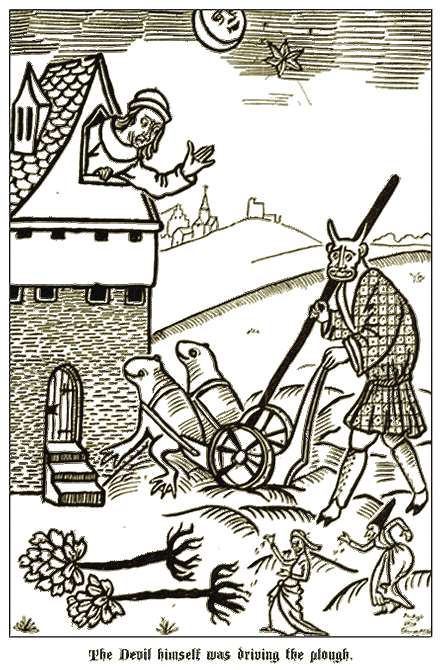
My poor Sheriff groans and goes back to bed, and tries to believe it is a dream; but no, next morning there are all the wine trees withered, and the ground covered with great coarse, rude weeds.
So he calls up the gardeners and tries to clear the ground; but what was the use?
My weeds would by no means be moved, but put out their thorny hands and flung down the gardeners, and used curses horrid to hear; so my Sheriff, all in a tremble, runs off to Ottilia.
Sheriff: He had changed his mind about the money; she should have it as soon as he could find it. Meanwhile, she might suggest something for his garden, which was clearly bewitched!
Ottilia: Let her have the money at once, and she would see what she could do for his garden—though, let him mark, she knew nothing about it!
Sheriff: How was he to raise the money at once?
Ottilia: He was very simple! Let him sell three links of his great chain of office!
Sheriff: But the chain did not belong to him, but to the town!
Ottilia: All the better for him; and he could put three links of gilded lead in place of the others, and no one would be any the wiser!
In summa, the Sheriff sold the three links privately for seven hundred thalers, five of which he sent to Ottilia, upon which my weeds, who had been quarrelling and cursing like a regiment of free lancers, disappeared in the night, and the Sheriff put back the poor shivering wine trees.
Ottilia sent three hundred of the thalers to Don Felipe and put the rest by for herself.
So Don Felipe hired a ship and sailed for that island in the West.
And when he reached it he paid off his mariners, and put on his silvered silk and went to the king.
He found him in a castle on a river, a quiet spot outside the town; it was, in fact, a quiet country, where all things were of a grey colour, and the people moved slowly.
There were no bright flowers and no rare fruits nor birds nor beasts, hut there was plenty of good clothing and stout houses, and everyone seemed to have a penny in his pocket.
But the king wore a cotton velvet gown, shabby and mean, a little greasy hat, and shoes broken at the toes.
He sat under the apple trees, and by his side was the queen, pale and homely, and darning hose.
And about the orchard played the seven princes in homespun doublets and the seven princesses in linsey-woolsey kirtles; they all had long noses and small eyes like the king, and red hair and large mouths like the queen.
And though their father was the richest monarch in the world, there was not one of them who had not a patch or a darn on his garments or in his hose.
Now Don Felipe began to feel very dismal about the issue of his mission, but he tried to disguise the lowness of his spirits, and he gave the king an account of his project and his good hopes of success.
His Majesty was intelligent, and he listened keenly, stroking his long chin and closing his small eves; and when Don Felipe had finished, he spoke thoughtfully, after this manner:
King: It was a fine story, and if there was truth in it, they might both be rich men; but he must think it over: it would cost a great deal of money to send a ship, and supposing after all it turned out a delusion? All the money would be lost, and that was dreadful to think of.
Don Lopez: His Majesty need not think of it, for it was perfectly certain that the money would not be lost, but returned a thousand-fold.
King: Yes, he might feel certain, but where were his proofs?
Don Lopez: He had no proofs; let His Majesty risk the money.
King: He had never risked anything yet. However, let him tell him what he would get if he gave the ship and the expedition succeeded.
Don Lopez: He would be king over the New Country, and a quarter of the treasure found there.
King: Those were miserable terms: he wanted all the treasure.
Don Lopez: That was impossible: half was promised already to a certain lady who had helped him and was a very dear friend of his.
King: Well, he would think over it.
So he dismissed Don Lopez, giving him neither drop nor crust, and began to talk over the matter with the queen.
The truth of the matter was that he was on the verge of war with another king who ruled a little island near his own, and a bitter grief it had been to him to think of the gold he must spend on this war, for though it was very certain he would conquer his neighbour, still it was a poor little land, and would not repay his expenditure: therefore how mighty convenient it would be, could he but get this new land and the treasure! As for Don Felipe demanding half of it, that was a mere jest; they could easily find some way of disposing of his claims.
In summa, they agreed that if they and the fourteen princes and princesses went without butter and sugar and new clothes for ten years, if they dismissed the Lord Chamberlain (and Heaven knew how useless he was!) and did his work themselves, they might make up for what they would have to expend on the ship.
So the next day Don Felipe was sent for, and after much bargaining he agreed to take five thousand pounds (as they call the gold pieces in this country), wherewith to equip his expedition, though he swore that it was not enough.
With many sighs and groans the king took up his keys and went to his treasury, and unlocked one of the cases where his brave gold was stored. But when he saw it there, fresh and bright and smiling, and thought of counting out five thousand of these darlings and handing them over to this stranger, his heart utterly failed him; he hastily locked the casket and treasury and hurried away, saying rudely that he had changed his mind.
Now Don Felipe was an angry man: he cursed the grey island and the grey king with the long lip, and out he set for the little country with whom my miser was going to war.
And when he reached the court of the neighbouring king he had not a penny in his pocket, and he had sold his silvered silk for his poke full of meal and a piece of flesh.
He found the king and all his courtiers roaring and shrieking round a great table, and they all had jolly red faces, their mouths full of meat and their hearts of kindness.
They made him welcome, they feasted him and toasted him, and when he came to expound his theme, they all with one accord said he should have the money.
So they went on drinking and singing until they could neither drink nor sing, and so to bed, very contentedly.
But the next morning the monarch, being sober, sends for my mariner.
King: How were they to find the money? Himself he had none. The very clothes he wore were not paid for.
Don Lopez: He might borrow from the nobles.
King: He had already; he had not left a white piece to one of them. Don Lopez: There were always the Jews.
King: He had squeezed them dry already.
So Don Lopez could think of nothing more to say, and they sat staring at each other dismally.
Then in came the courtiers and turned their pockets out and racked their brains, but could neither find any money nor think of how to obtain any.
For, as the king remarked, all ordinary devices had been exhausted long ago.
Then one of them remembered a certain fat priest who had an image of Our Lady which worked miracles, and, as lie put a good price on them, he was very rich.
King: Why did he not mention this priest years ago?
Courtier: Well, he was a holy man, and he (the speaker) was afraid of the vengeance of Heaven.
King: He was no holy man, or he would not charge for his miracles, which were not his at all, but Our Lady's, and if she was given a new gown probably she would say nothing.
So the soldiers were sent out to seize the priest and take away his treasure, which they found was a mighty one.
They brought it away in two carts, and also the image of Our Lady, who was wearing a very poor old smock, covered with tattered lace.
So the king, who was a just man, gives her the queen's best gown; and content she must have been, for nothing happened because of their taking of the treasure.
In this way Don Felipe at last equipped his ship and set sail, leaving the harbour at noon, driving before a southern gale, and so into the distance and away.
Meanwhile the king spent the money that remained wisely (which made men marvel), and prepared his country for war.
And war began and raged for a year and a day, on the land and on the sea.
And at the end of this time the miser had nearly crushed his neighbour, for all the good fight that king made; for his country was small, and he had few ships, and few soldiers, and very little money.
But he maintained a high spirit and sang cheerfully over his bottle at night, and fought bravely in the day with his fine battle-axe, whack, whack, whack!
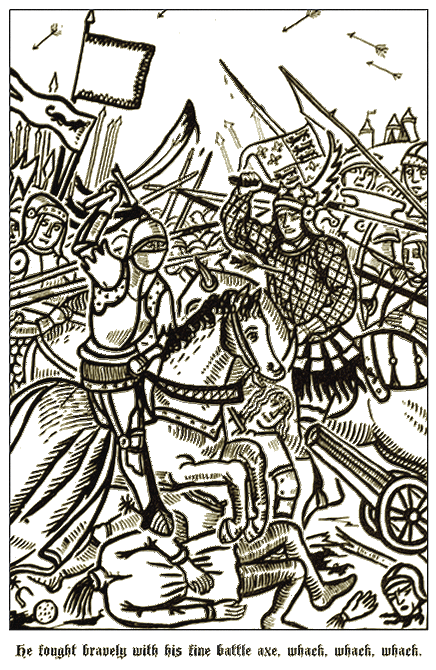
Still the time came when he could fight no more, for there was nothing left to fight with; and the miser was preparing to capture him and his subjects and make them all slaves for the rest of their lives, when one fine day who should sail into the harbour but Don Lopez, whom everyone had given up for lost long ago!
In summa, after many adventures which cannot here be related, he had actually reached the New Country, and it was as rich and wonderful as ever he had dreamed: there were gold and silver, new birds, new beasts, new flowers, new fruits, and Don Lopez drew after him four great boats he had built, filled with ingots of gold and silver and strings of rubies and emeralds. You may imagine the joy of my king, how he paid his soldiers and bought them new arms, and finally fell on and defeated his enemy, who was obliged to pay a heavy price for peace, and went mourning for the rest of his days.
So my miser had not only lost the New Country because of his avarice, but nearly his own as well; while the other king speedily became one of the richest and most powerful monarchs in the world.
And the first thing he did was to send for the priest and offer to return him his treasure; but they found him with a new image working miracles, and already as rich as he had been before, so they gave him no money, but a silver bird, which shone like a lit lamp, and had tail-feathers of crimson.
But Don Lopez was not so generous: he had become avaricious, too, and the last thing he intended to do was to give half his gains to Ottilia.
He hoped the hag was dead, and resolved never to go near that country in case she was yet living, so put her out of his mind and spent his days and nights counting his money.
But one evening while he was in his strong room, surrounded by pearls and coral, and silver and amber, emeralds, rubies, lamps of turkis, royal bone and gold—while, I say, he was grinning and gloating over these treasures, down came my witch through the chimney, and oh, but he was vexed to see her.
She said nothing at all; she just raised her broomstick and brought it skilfully down on his head.
In summa, the next morning they found Den Lopez lying, a yellow corpse, on the ground, and all about him, instead of gold and silver and jewels, were heaps of withered leaves.
So that was the end of my avaricious Don Lopez and his treasure.
As Father Aloysius dosed the book a messenger came running in with a mouth like the letter O.
"The Lord Cardinal," cried he, "is dead! He was crossing the ferry when it upset and he fell in and was frozen stiff like a winter radish!"
At the time Father Aloysius said nothing, but afterwards he remarked that it was yet a third instance of the judgment overtaking avarice.
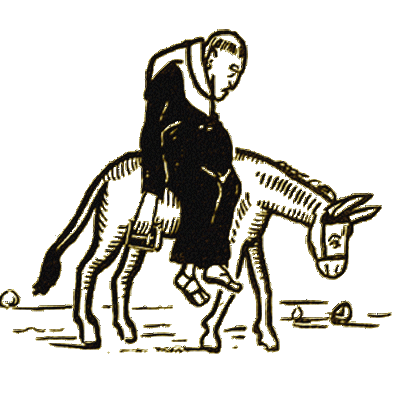
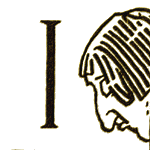 T was when the mountains were all veiled in snow,
the ground stiff with ice, and not one leaf left on the vines, nor
indeed on any tree save the fir and olive, that Father Aloysius had
occasion to speak again of the Deadly Sins; and this time he spoke of
SLOTH, the seventh sin, or, as it is better expressed, Accidie,
which means really more than Sloth, also Melancholy and Gloom and
Sourness, but is commonly translated Sloth, and has been called by a
great man "the rotten-hearted sin of Accidie."
T was when the mountains were all veiled in snow,
the ground stiff with ice, and not one leaf left on the vines, nor
indeed on any tree save the fir and olive, that Father Aloysius had
occasion to speak again of the Deadly Sins; and this time he spoke of
SLOTH, the seventh sin, or, as it is better expressed, Accidie,
which means really more than Sloth, also Melancholy and Gloom and
Sourness, but is commonly translated Sloth, and has been called by a
great man "the rotten-hearted sin of Accidie."
Now Father Aloysius had need to speak of this sin because it was much abroad among the novices, who were very willing to lie abed in the morning complaining of the cold, and very loth to do any work, saving it was weather to sit by the fire and do nought else, adding matter of complaints as to the snow, and their stiff fingers and cold toes, and making wry faces over the meals, and being generally dejected and miserable, huddling together and shivering in corners of the Monastery.
So Father Aloysius got them all together in the great hall and settled himself by the fire and made them sit in two rows before him while he lectured them on the sin of Accidie, which he could see (he said) by their blue faces and bunched shoulders had a hold of them all.
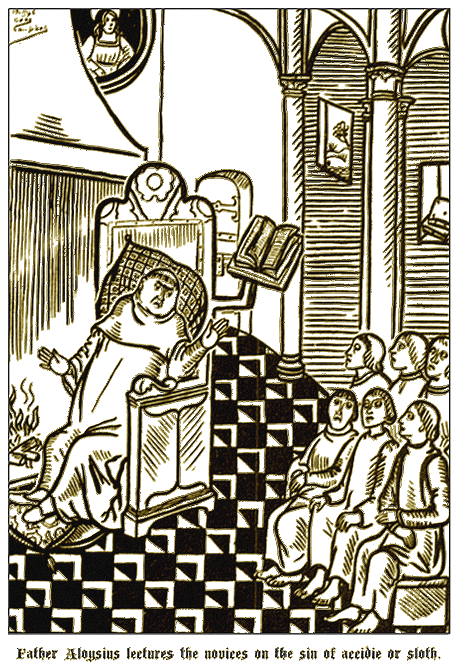
For this seventh sin (said he) had an especial Devil, which was of a blue colour, and it is credibly asserted by many that when this particular blue devil commences plaguing a man (as he does plague those who fall into this seventh sin), he is worse than all the other devils and fiends and imps put together.
Now thus (he added) do I propound Accidie; what says the Book? "Cursed be he who doeth the service of God negligently," and he who follows this sin of Accidie doeth all things negligently, yea, with heaviness and unlust and carelessness and annoy.
Saint John too saith that this Accidie is an abomination: it might be called the child of Wrath and Envy, for they make great bitterness in the heart, and from this bitterness is born Accidie; or it might be called the offspring of Pride, which so puffs up a man that he thinks there is no need for him to labour or follow goodness, and so sits him down sourly, sucking his thumbs and growing dismal that the world is passing him by without acknowledging his merits.
Then from this Accidie and Sloth comes a yet more dreadful thing, nay, the most awful thing known to man, namely a disdain and a despising of all the things of this world, and an indifferency to all man has done, and may do, and an apathy towards the great graces and beauties there are everywhere, and, worst of all, a despair of God's mercy and a dread of Hell, which last is that sin against the Holy Ghost which may not by any means be forgiven, and which opens a man's heart to all the sins and evils there are, for he is in despair and melancholy, and, believing nothing, Both that which he lusts after and slips soon to perdition. And this was the sin of Judas.
And he that is taken by Accidie is dull in mind and body, given to Ignorance, who is the mother of all harm, and to neglect and heavy slumbering, so that the days slip through his fingers as sand through an open hand, and return whence they came without bringing him any profit; neither in this world, nor the next, for Heaven is only to be gained by much striving, and Paradise is for them that labour and not for idle folk.
And sometimes it happens that a man may sink so deep in this sin that he take his own life, which is very unnatural and horrible to God; but more often they are like folk that fall into a ditch and will not make the effort to rise out, nay, if one help them, they fall back again and there they lie, while all pass them.
Surely this is the most miserable and wretched of all the Deadly sins, and so the Virtue that is set against it is the highest and noblest of all the Virtues, namely Fortitude, or Strength, of which there are several species, as Magnanimity and Magnificence and Faith and Constancy. And these are very powerful and princely virtues, and certainly to be put before the other virtues, which may be set forward thus: Meekness or Humility, as against Superbia, or Pride; against Inuidie, or Envy, Love and Charity; against Ire or Wrath, Patience, Obedience, and Gentleness; against Avarice, Generosity and Pity; against Gula, or Gluttony, Temperance; against Luxuria, or Lust, Chastity and Poverty; but the highest of all these remains Fortitudo, which (as I have said) is set against this wretched sin of Accidie.
And at this place I will give you the story of the young man of Arles, which is memorable and well worthy to be preserved.
This young man was so sunk in this seventh sin that he had no more pleasure in anything, but passed his days in bitter discontent and melancholy self-communings.
He was young and healthy and well-favoured, but he utterly slighted these blessings: he had a fine house, horses in his stables, and good food on his board, but he despised all of them; he had worthy friends whom he disdained, and he had certain talents that he ignored and left uncultivated and rusty.
And there was all the world before him, and many things lie might perform and see, but he would have none of them, but remained always shut within his house, lazy, idle, melancholy, and drifting towards despair.
He wondered why he was born just to grow old and die; the world seemed to him very miserable, and he doubted very much of Heaven.
For he was as one blind, yea, his soul was blind and dumb; he crept about the town of Arles, and saw nothing but rows of houses and commonplace people and dirt and sorrow; he went into the country, and saw nothing but these same people labouring in the fields and the poor huts in which they dwelt, all so dull and ugly that he returned home gloomier than before. He did not see the pretty maidens watering roses and carnations at their casement windows, he did not see the little children playing battledore and shuttlecock with little crowns of feathers (blue and red) that mounted up into the sunshine, nor the beautiful sleek cats on the doorsteps, nor the happy old women carding wool and singing hymns in praise of the Virgin, nor the young masons at work on the new church all flushed with pride, nor the artisans going home in the evenings with eager feet.
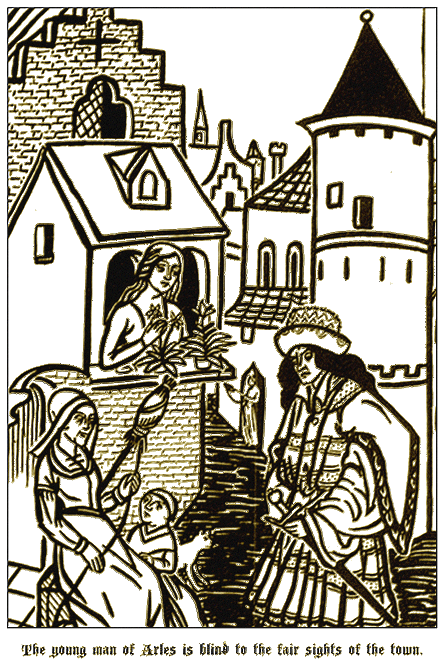
Nor when he went into the country did he notice the fair shapes and colours of the trees, the crystal stream churning swiftly over the stones, the little flowers on the bank, the smooth white sides of the oxen drawing the plough, the little birds on the swaying boughs, the light and shadow of the forest.
Nay, not for him was the magnificence of the hills, or the beauty of the valleys, or the glory of the changeful heavens, with the sun like red gold, the moon like a pearl, the stars like frozen dewdrops; to him night and day were light and dark, and each was more wearisome than the other.
And so tired of life did he become, that he resolved to make an end of it; and one day took a piece of rope and went outside the town walls, and wandered along till he found a quiet spot by a little river, and there he put the rope round the bough of an old thorn-tree, and hanged himself.
But the rope was too thin (he had been too lazy to search for a more fitting one), and broke, and down he fell among the alders, and sat there on the banks of the river looking up at the rope, too slothful to mend it or return for another.
And when at last he took his eyes from the thorn-tree and the rope he perceived an angel standing upon the other side of the stream, regarding him keenly.
"Good day, Messire," said the angel courteously.
Now the young man blushed a little for shame at being seen in this guise, for his hosen were all wrinkled, his doublet stained, the buttons off his cuffs and the tags off his laces, besides which his boots were broken, and he had not shaved for a week; natheless he answered with his usual apathy—"Good day."
"Why are you so melancholy?" asked the angel. "And wherefore is this rope?"
The young man made an effort and replied gloomily:
"That is a rope to hang myself wherewith."
"Why?" asked the angel (he was very beautiful to look upon, with bright shining clothes, and two great wings lying out ruffled on his back, and a crown of coloured feathers, but to the dull eyes of the young man he looked no more than a large kind of bird).
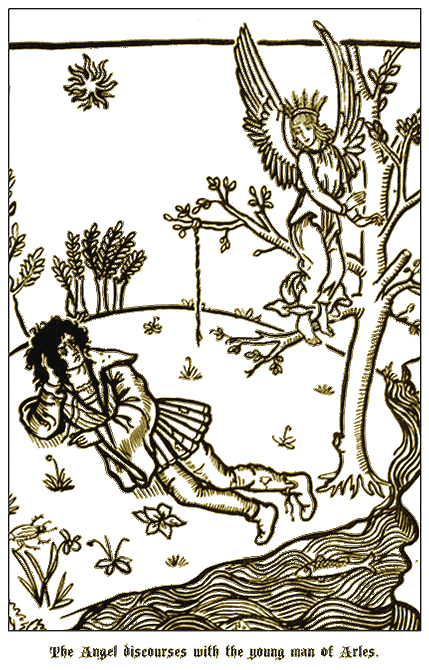
Moreover, he did not wish to talk, but to roll himself up on the bank and sleep, and, had it been a mortal speaking, he would have been sullenly silent; it being, however, an angel who was addressing him, he was impelled to some civility.
"Why, life is not worthy of being lived," he said.
"Nay," replied the angel, "yon are not worthy of living it."
"Not at all," said the young man. "I am a very good citizen. I never annoy my neighbours, and I always pay the taxes. But it is a miserable world, and I want to be out of it."
"Where do you mean to go?" asked the angel.
"Nowhere. I only want to be left in peace."
"Heaven is for those who labour, and there is no peace in Hell, and very little in Purgatory," remarked the angel thoughtfully.
"I do not believe," returned the other, "in any of the three."
"Then I suppose that you do not believe in me?"
"Certainly not. I see you are trying to make me think you are an angel; but it is all a pretence."
"What do you think I am?" asked the angel; he put his head on one side and looked at his reflection in the clear running stream.
The young man yawned and replied very rudely: "I think that you are nothing better than a kind of bird—a common bird, but what your name is I have forgotten."
"You are, of course, quite blind," said the angel; "you are also, I think, unhappy."
"Naturally," snapped the young man. "I was going to hang myself when the rope broke."
"Would you not like to be happy?" asked the angel in a gentle tone.
The young man began to sneer. "No one is happy."
"Then how does the world go on? Were every one like you it would all stop to-morrow."
The young man thought over that; certainly he could vaguely recall a vast number of people who seemed to be quite content; he could recall laughter and songs, and kisses, and gay dresses—he had always called these people fools and these things follies; but now, by the great goodness of God and because of the great joyousness radiating from the angel, he began to wish suddenly that he too was a fool.
"Would you not like to be happy?" repeated the angel, and he flew on to a bough of the thorn-tree, where the broken rope still hung, and sunned himself, spreading his bright wings in a great arc either side of him.
"Yes," said the young man suddenly. "I should. But it is a miserable world, and I can find nothing to interest me—nothing to do. Tell me how I may find happiness."
"You must search for it," replied the angel.
The young man was very much disappointed. "I have heard that answer before," he said gloomily.
"Because it is the right and only one," said the angel.
The young man yawned. "You might as well set me to find the Philosopher's Stone," he remarked.
"That is just what you should look for," said the angel; "it means happiness and health and wealth and honour—it means that you will see everything and understand everything."
For a moment the sluggard was roused, then he fell again into his gloom: "for no one has ever found this stone," said he; "is it likely I shall?"
"Not at all," smiled the angel.
Now this annoyed the other. "Oh, I do not know!" he grumbled. "I suppose that, after all, I have as much chance as any one else."
By which reply he showed that he was beginning to be a little dispossessed of his sin of Accidie, for a few moments previously nothing could have aroused him to anger.
"Well, try," suggested the angel; "it is better to be searching for what you will never find than to be hanging yourself on a May morning."
"Is it a May morning?" asked the young man stupidly; then he added: "Why do you trouble to give me advice?"
"Because you have the most beautiful rose-tree in Aries in your garden," was the reply. "And I and my friends have often rested there on our way home in the evening, so I give you this advice out of gratitude for your hospitality."
Now the young man had never noticed the rose-tree, so he said nothing, but sat looking foolish, and the angel lifted his head towards heaven and flew away and away until he was but a speck in the springtide blue.
And the young man looked at the broken rope, and decided that it would be just as much trouble to get another one as to begin searching for the Philosopher's Stone, and, after all, if the angel was an angel, perhaps he was right in what he said, and there might be such a thing as happiness.
So he went home and made a few lazy experiments of his own, but they were quite foolish, and he began anew to be weary of it all, and to disbelieve in everything; but, on hearing some one laughing in the street, he was inspired to continue his search for happiness, and he went to a certain Alchemist who lived in that town and hired himself out to him as an assistant, so that he might learn the practical parts of this science.
Now this Alchemist had been searching for the Philosopher's Stone for fifty years, and had spent many thousands of crowns on his experiments; he had travelled in Persia, India, Arabia and Palestine in search of the great secret, and spoken with many learned and famous men, Magi, Jews and Magicians.
But none of them had the secret, or, if they had, would not part with it; so the Alchemist returned to his native town and worked by himself, and for his living he engraved gems and silver, and sold perfumes and lotions, and painted pictures to be set in rare and costly books.
Now he had lately lost his assistant, who had left him to go on his travels, and he took my young sluggard because he offered to serve without any wage.
And so they worked together at the furnaces and retorts, mixing the metals, melting, refining, separating and combining, and the young man became interested and almost glad to be alive.
For the old Alchemist told him many strange things, and for himself he began to notice the colour and flash of jewels, the hardness and shape, the feel and sparkle of them, the scent and sweetness of the clear green essences, the crystal-clear perfumes, the white milk lotions all in their bottles, slender, squat or oblong, standing in rows on the Alchemist's shelf—he learnt to understand the excitement of the long hours of waiting beside the furnace, burning deep-coloured like a red rose or clear like a red diamond, and he began to know the delights of poring over the great old books where the ancient masters had hidden their learning.
But he was still a victim of Accidie; never could he quite believe that there really was such a thing as the Philosopher's Stone (though again and again the Alchemist had told him that there was no use in even beginning to look for it without Faith, fortified by Contemplation and Prayer), and still he had his moments of gloom and melancholy and despair, when he wished that he had hanged himself as he had meant to.
And often his Master would find him asleep by the furnace with the fire gone out, and many times he would refuse to get up in the mornings, or sit idle all day sucking his thumbs.
But the Alchemist bore all this, because he paid him no wage.
Now there was a certain book, the leaves of which were of wood, and the covers of which were of pierced brass and within it were most marvellous pictures made with a reed-pen, and coloured with bright colours, and this book had been given to the Alchemist by a certain Jew, to whom he had once done a service, and this Jew had told him the book contained full directions for making the Philosopher's Stone—but there was no writing in it, only symbols and pictures, so that the meaning was mighty difficult to unravel: yet the Alchemist thought that he had done it, only was his labour made useless because certain pages of the book were missing, and could by no means be found, though he had searched all the world for them.
Now soon after the young man had begun to practise Alchemy there came a stranger to the house of the Alchemist, and desired to see the Master.
He was a very sober person, decently clad in green, and was thought to be a customer for gems or perfumes; but proved to be no such thing, for when he was alone with my Alchemist he says very quietly: "Have you a certain fair book, very old and large and gilded? And has it leaves of wood, on which are certain pictures done with a reed-pen and admirably coloured?"
"Surely," replied the Alchemist, beginning to tremble with excitement; "and these same pictures are no less than directions for the Magnum Opus, if a man could unravel the meaning, which, to wit, I think I have done, but alack, there are some leaves missing."
"Exactly," said the stranger, and he took from the breast of his robe four leaves of wood, covered with fair and shining figures. "Here are the remaining pages of that delicate and precious book, and when you have the magistry of them, then you will have discovered the great secret for which you have so cheerfully and willingly laboured."
And at this the Alchemist began to weep and cry for joy, and begged to know who his benefactor was—if he was some great wizard such as Virgilius?
"I am," said the other, "no less," and with that left, while the Alchemist, all in an amazement, went up to his laboratory and set the missing pages in the book and began to study the problem of them.
And this he now soon mastered, discovering the prima materia, the agents he must use, the transmutations and the projections he must proceed to.
Yet for a week he laboured, and there was no result in the vessels; then he applied himself to Prayer, and again set to work.
And presently he found in one of the vessels a strange stone, no larger than a nut, transparent and of a pale brimstone colour, and of smooth texture and a shining look, and this they wrapped in a piece of wax, and put in a crucible with two pounds of lead, and this crucible was set on the fire, and all night the Alchemist and the young man worked the bellows and prayed.
And towards the morning the crucible made a hissing sound, and, on taking it off the fire and looking in they found it was full of a seething metal of the fairest colours possible, and they poured out this aurified lead on to a slab of pure clean alabaster, where it flashed into a green tint, then settled into the hue of a lively red, the colour of fresh blood. With that they poured it again into an ingot and left it to cool, and, on presently looking at it, they found it to be a bar of the most splendid shining gold.
So, after praising God, they ran off with this ingot (still warm), and showed it to a goldsmith, who put it to all the tests and pronounced it the finest gold in the world.
"We have found the Philosopher's Stone," said they to each other, and they went home, and, again following the directions, produced another piece of that excellent yellow and transparent substance, half of which they projected on to a cup of base metal, which changed to pure gold with a small ruby in the bottom, made by the great strength and virtue of this wonderful stone.
And the other half they dissolved with aqua-fortis, and it turned into a medicine the colour of honey and exceedingly sweet, and so strong that garnets, corals and silver-leaf being put therein, did dissolve to their natural tinctures.
Now this medicine, being tasted, proved to be a most powerful remedy, and cured them of all their pains and fatigues, and put new life into them.
So they ran to a neighbour who was ill of a dropsy and gave him to drink of the medicine, and he straight away recovered.
Now were they aware that they had really discovered that most noble substance which was also the Elixir of youth as well as capable of turning into the finest gold all baser metal.
This was a secret that must be very jealously kept, for it was obvious that if they made their discovery publicly known the King or some great one would seize them and keep them in durance, where they would be forced to use their knowledge for his benefit, as had indeed happened many times before to unfortunate alchemists.
On the other hand, if they remained in Arles, practising and saying nothing, the secret would surely get abroad through gossip, and they were equally sure to be murdered and robbed by some profane person who lusted for gold.
So they resolved to give out that their experiments had failed, and that they were going on their travels in further search of the great secret; and thus they would settle in some foreign land, and enjoy their discovery, protecting themselves by saying that their wealth was natural wealth. And the Alchemist, who was a very pious, holy and charitable man (else he would never have accomplished the Magnum Opus, for its achievement is not given to carnal-minded or common people), intended to endow seven hospitals, seven churches and seven schools, together with a charnel-house, all built new from the ground, to the glory of God.
And the ingot of gold and the gold cup with a ruby in the bowl (as the pearl is within the shell of the oyster) he gave to a poor little church that had no treasures.
Then did these two put their affairs in order and sell up their goods and make their preparations for leaving their country.
Now as the Alchemist had never been rich, and the young man's estate had decayed through his sloth and neglect, or had been dissipated by fools and stolen by knaves owing to his indifferency and apathy, they found, on putting their resources together, that they had but very little money with which to start on their travels and to set up a new laboratory, so they resolved once more to manufacture some portions of that noble and excellent substance before they started; they calculated that, if they obtained three pieces the size of a small apple, it would be sufficient for twenty tons of gold.
So they again followed the directions of the book, and produced the three stones; two of which they put by in a neat box of cedar-wood, and the third they divided, and cast a portion of it, the size of a coriander seed, into the crucible with lead.
Now the Alchemist being on in years and fatigued, made a medicine of the rest of this portion (as they had done before) and drank it; soon after he fell into a sweet sleep, and they young man was left alone to watch the furnace.
As he sat there, in the silence and loneliness, this miserable sin of Accidie, from which he had never been quite free, came upon him strongly; he wished he was in bed, instead of tending the furnace; he wished he could lead his old lazy life, instead of undertaking travels to a foreign country, where doubtless there would be perils and fatigues to be endured.
As for the Philosopher's Stone, he began to doubt that they had really discovered it—was it not all perhaps a delusion? Had that really been gold?—and, if so, how were they sure that they would ever find it again?
So he took down the book and the cedar-wood box containing the portions of the stone, and seated himself by the furnace and looked from one to another, struggling with his doubts and his sloth.
Now at this moment there entered the room a person well known to those who follow Accidie, and very familiar to my young man, i.e. the Blue Devil, who is the captain of a band of smaller blue devils very little better than himself.
The young man had not seen him for a long time, not since he had met the angel by the thorn-tree, and he was very displeased to sec him now.
He was certainly very ugly; his feet turned backwards, he had a great hump on his back, his eyes were set crooked so that he could never see things straight, and covered by thick black glasses so that he could never see things clear.
He took the stool in the corner, he looked at the furnace, at the book, and the cedar-wood box. "What a waste of time!" he remarked.
"No," said the young man. "I am making gold."
The Blue Devil laughed. "You had better go to bed," he replied.
The young man shook his head. "No," he said. "I have found the Philosopher's Stone, and soon I shall find happiness—as the angel told me."
"There are no angels," remarked the Blue Devil.
The young man continued, trying not to notice his visitor: "I believe this book—and the evidences of these pieces of stone."
"How silly!" said the Blue Devil. "The book is but a collection of jargon, and the stone is just a compound of mercury and sulphur."
The other doubtfully opened the book, and certainly the pictures looked very dull and stupid; he opened the box, and certainly the stones appeared very dull and ordinary. "But we made gold and a ruby and a wonderful medicine," he objected.
"Nothing of the kind," said the Blue Devil. "You lost your head, and did not know what you were looking at."
"But the goldsmith and the man with the dropsy?"
"They were fools like yourself," replied the Blue Devil; "and remember the gold was given away (if you had tried to buy something with it you would have soon seen if it was good gold or not); and, as for the sick man, he was probably not sick at all."
"Probably you are quite right," sighed the young man. "Meanwhile, I ought to look to the fire; I see it is going out. Would you put on some more coal?"
"Not I," said the Blue Devil with a sneer. "Why should I get up from this chair where I am moderately comfortable to stoke that furnace when I know there is no good coming from it?"
The young man yawned seven times, and it is a well-known thing that he who yawns seven times gives the Blue Devil great power over him.
So that the fiend spoke again at once, and quite briskly: "Why do you stay here enduring all this discomfort and misery, when you might have been comfortably hanged long ago? You know that there is nothing in any of it—there is no Philosopher's Stone and no Elixir of youth and no happiness—why do you give yourself all these fatigues?"
"But I promised the Alchemist," murmured the young man.
The Blue Devil soon disposed of that objection. "The Alchemist either a fool who is cheating himself or a knave who is cheating you—come, put an end to it. You know that you decided long ago that life was not worth living."
So saying, he produced a nice long coil of rope and fixed it to a strong nail on the wall, and up got my young man, overcome by this dreadful sin of Accidie, and stuck his head in the noose; but the Blue Devil had been too lazy to make the noose the right length, and so the young man stood with his feet on the ground, and, being too slothful to move, in that position went to sleep.
Now he had placed on the edge of the furnace the book and the cedar-wood box, and the Blue Devil, as he slouched away, gave them a shove and both fell into the furnace, where they were burnt to cinders, which furnace, soon after growing cold, the transmutation in the crucible was spoilt.
And so what did my Alchemist find in the morning?
That this excellent secret was for ever lost!
The furnace out—the lead unchanged in the vessel—and in the ashes the brass covers of the book and the scorched remains of that precious substance.
And by the wall the young man standing asleep, his head hanging in the noose.
Now the Alchemist was a good, holy and patient man (or, as I have said, he could never have followed this profession); but, once he had grasped what had happened, he did not hesitate a moment.
He looked at the nail; he drove it farther in with a blow from the heel of his shoe, then he lowered the knot and tightened up the rope.
And so my sluggard was hanged in earnest.
After this the Alchemist gathered up the available crowns and calmly went off to another country, where he recommenced his labours without an assistant.
And after a few years Virgilius again came to his aid, and he rediscovered that marvellous stone, and died a holy man.
This is the end of these stories of the Seven Deadly Sins; there are others to be told of the Ten Commandments, which, said Father Aloysius, are interesting, but greatly tax both power and intelligence to deal with.